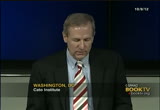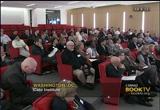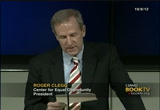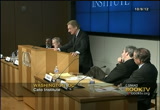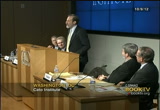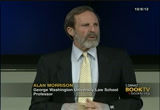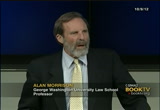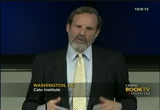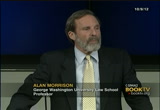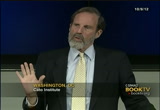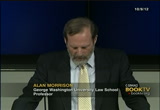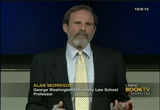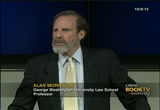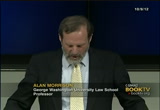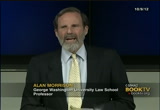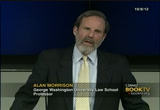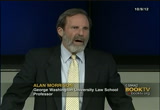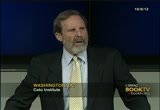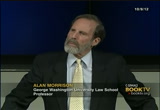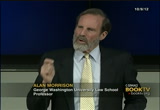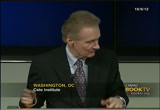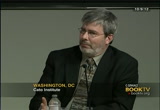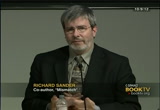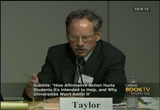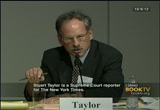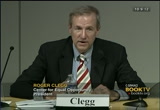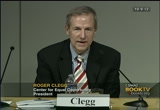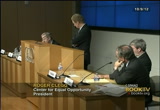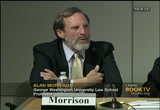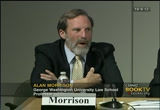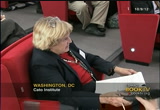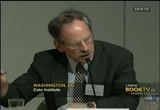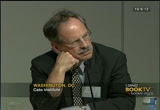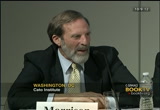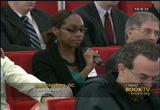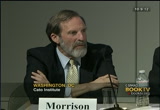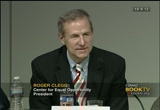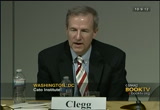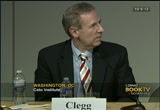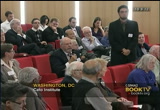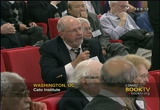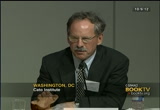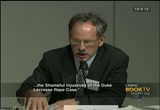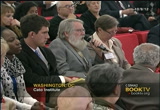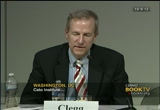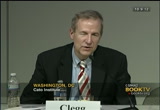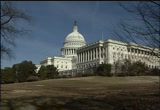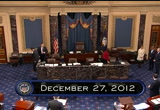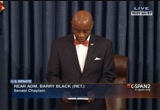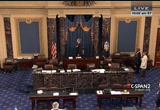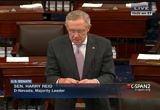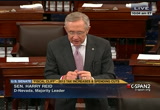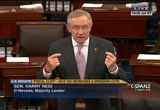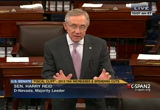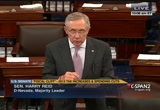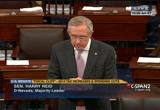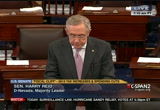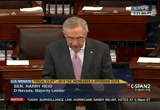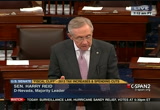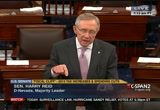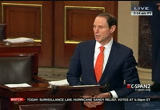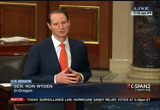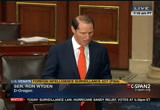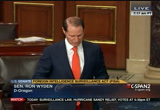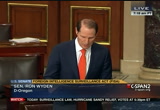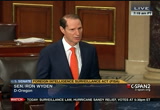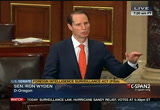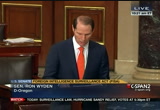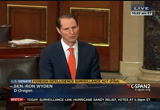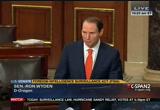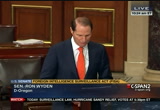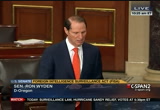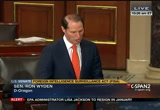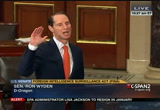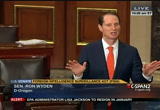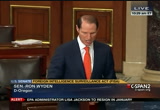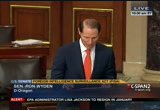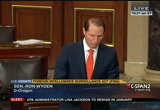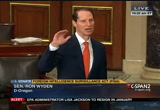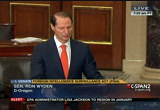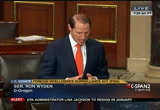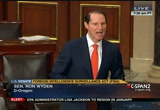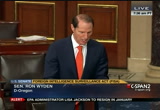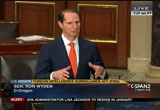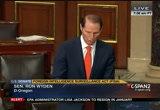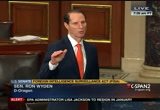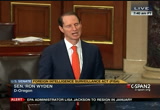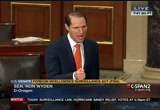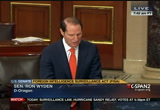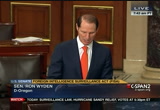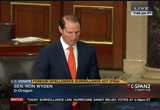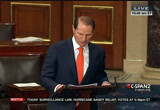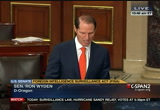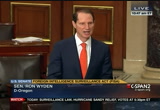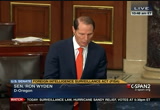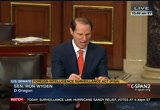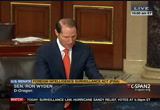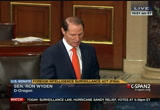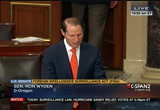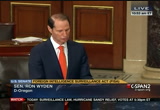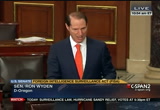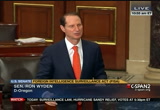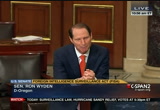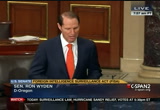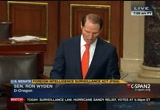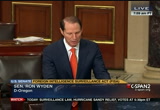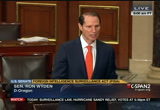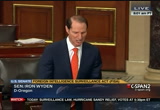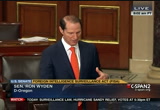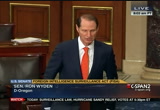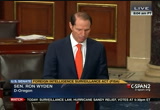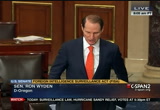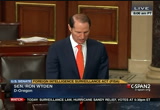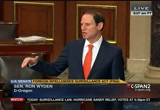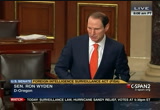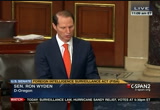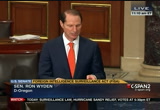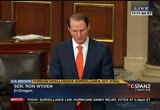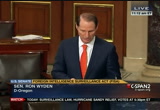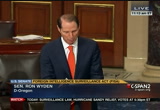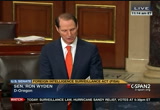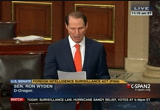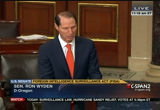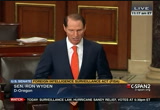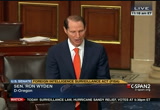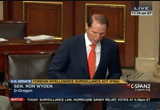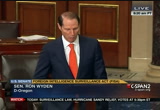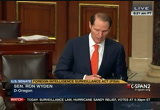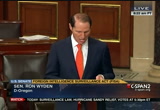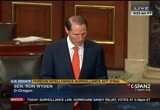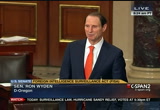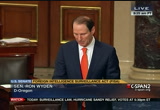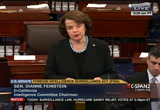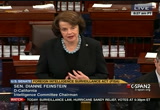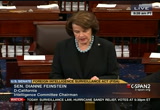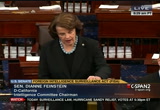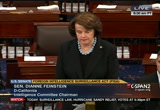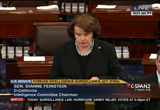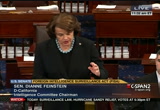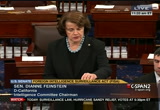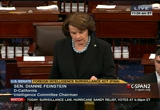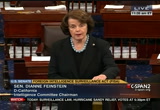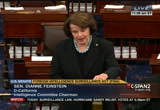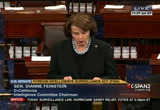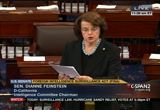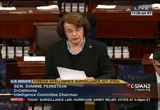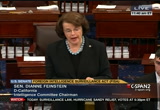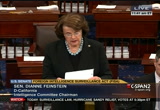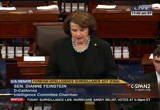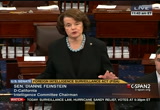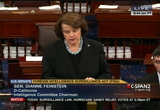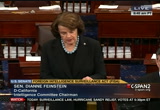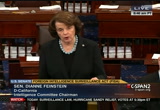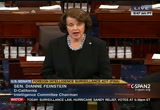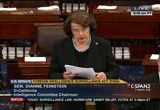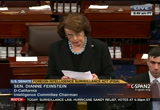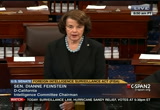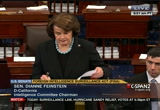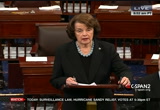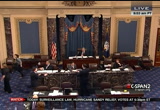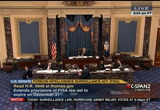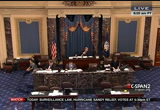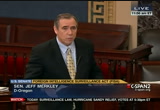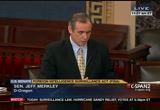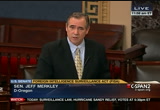tv U.S. Senate CSPAN December 27, 2012 9:00am-12:00pm EST
9:00 am
of the 1964 civil rights act. not all of it, just the problem part. i say there's only one -- [inaudible] in this so i'm not picking and choosing. quote: no person in the unite shall on the -- in the united states shall on the basis of color or national origin be subjected to discrimination under any program or activity receiving federal financial assistance. that's what happened to abigail fisher. it's not disputed. she was treated different lit because of -- differently because of her race, color and national origin. now, we're not going to be talking so much about title vi tomorrow, we're going to be talking about the constitution because the supreme court said, well, that doesn't really mean what it says, you know? we think that it just means what the constitution means. and the constitution is, you know, has a little more egg l room,al -- wiggle l room,al l though not a lot.
9:01 am
the constitution outlawed, i mean, the whole purpose of the equal protection or the 14th amendment was to outlaw racially-separate legal standards. that seems pretty straightforward too. and, you know, there are others, there's another federal statute, section 1981 that banned racial discrimination in the making of contracts, and the court has made clear that that includes college tuition. so this ought to be, you know, fairly straightforward. but the supreme court has said that, you know, those words really don't mean what they say, there's not a categorical ban and that there is an exception in this area. and you would think, well, gee, you know, if the supreme court is going to carve out an exception, you know, to the principle of racial discrimination that's, you know, pretty clearly there in the haw, you know,, the branches have
9:02 am
spoken to this, it must be pretty, pretty strong and undeniable, you know? it must be something like, you know, it helps us identify somebody that's about to set off a nuclear bomb in the middle of new york city or something like that, you know, in order to be compelling. well, you know, the argument is that if you use racial discrimination in college admissions, um, it's likely that there will be somewhat more of unrehearsed, interracial conversations among students and that the african-american kids and the latino kids, you know, who get these preferences are
9:03 am
going to say something to the white kids and the asian kids that is, just has overwhelming, compelling educational benefits for them. that's it. s it is a what -- that is what the university of texas is arguing. that is the exception to the principle of nondiscrimination that the supreme court has recognized. okay? now, i think that's ridiculous. and, indeed, you know, the reason the court, you know, buys this is because there are social scientists out there who say, no, it's true, it's true. it really happened. now, increasingly these educational benefits -- which, you know, make only marginal improvements to education, you know, at best, are disputed.
9:04 am
you know, it is increasingly disputed that there are any eggal benefits. -- educational benefits. but i think it's also important for the court to bear in mind, and i think the court's jurisprudence is leaning this way, that even if there are some educational went fits -- benefits, they've got to be weighed against the costs that are inherent in engaging in this discrimination, right? i mean, something as compelling, something, if an interest is compelling, you've got to consider the inherent liabilities in the racial discrimination that it involves too, right? well, what are some of the costs of racial discrimination in university admissions? well, this is -- i should know this by heart, but i don't. this is my little litany that i post on, you know, comment
9:05 am
sections on web sites all the time. here it is. costs of racial discrimination admissions. it is personally unfair, passes over better qualified students and sets a disturbing political, legal and moral precedent in allowing discrimination. it creates resentment. it stigmatizes the so-called beneficiaries in the eyes of their classmates, teachers and themselves as well as future employers, clients and patients. it fosters a victim mindset, e removes the incentive for academic excellence. it encourages separatism. it compromises the academic mission of the university and lowers the overall academic quality of the student body. it creates pressure to discriminate in grading and graduation. it breeds hypocrisy within the school and encourages a scoff law at tuesday among college
9:06 am
officials. papers over the prop of why so many latinos and blacks are academically competitive, and it gives states and schools involved in unsavory activities -- like decides which racial minorities will be heard and which ones not -- and how much blood is needed to establish group membership. and i didn't want even mention mismatch. -- i didn't even mention mismatch. [laughter] the mismatch book, in addition to o giving chapter or and verse and ample, irrefutable documentation for why this is a real problem also touches on some of these other problems that i've listed too. you add all those up, okay, and it seems to me that it's a lot stronger than the educational benefits from these random interracial conversations we
9:07 am
might be having more of if we use racial preferences in admissions. okay. well, let me wrap up with one sort of happy note, but then one not so happy note. it seems to me -- and i think it ought to seem to the justices -- that one reason why we ought to end this nonsenses now is because of the changing face of america, right? 40 or 50 years ago, basically, it was a pree.com in a minutely black and white country, and you had a lot of people who had only recently been discriminated against, only recently been living under a jim crow system, okay? now we're talking about the people who get preferences now were born in 1994. that doesn't seem like very long
9:08 am
ago to somebody my age. 994. that's, you know, 30 years after the 1964 civil rights act. according to the latest census, one in four americans now describe themselves as being something other than white. african-americans are not the largest minority group anymore. they haven't been for a while. latinos are a larger minority group than african-americans are. and neither one of them is the fastest-growing racial minority group. the fastest-growing racial minority group is asian-americans. african-americans are growing at only a 12.3% rate, white americans at only a 5.7% rate. another rapidly-growing group are people like our president who could check more than one box in the race and ethnicity section of their questionnaire. seems to me, and i think in the supreme court, that in a country
9:09 am
like that we cannot have a legal regime that sorts people according to their skin color and what country their an access or to haves came from and treat some people better and other people worse paced on which silly -- based on which silly little box they check, okay? now, frequently the people who are arguing in favor, i mean, i dee bait this issue all the time, let me tell you. two minutes into the debate we're not talking about the educational benefits of interracial conversations, right? we're talking about slavery. and we're talking about racial disparities. that's the only justification that anybody really believes in. you know, they don't -- you know, even the academics don't really believe that there are these compelling interests from these interracial conversations. many think they're important, but that's not really their justification. so why do we have these racial disparities? you know, isn't it all because
9:10 am
of slavery? well, last week the federal government as it does, you know, once or twice a year came out with its latest figures on birthrights. and in particular on one i'm going to point to is the illegitimacy rate or out-of-wedlock births. here they are. 72.3% of african-americans now are born out of wedlock. 72.3%. american indians, 66.2%. latinos, it's 53.3%. for whites it's still pretty high, but it's 29.1 percent. and for asians it's 17.2%. so in other words, seven out of
9:11 am
ten, six out of ten, five out of ten for blacks, american end yangs and latinos. these are the so-called underrepresented minorities that get racial preferences. and then fewer than three out of ten and fewer than two out of ten for whites and aiz items -- asians, people who are typically discriminated against. it is no accident that these figures line up quite well with how well different groups are doing not only in terms of education, but in terms of crime and, you know, whatever social indicator you want. that is the real problem. and, of course, that is not going to be fixed by racial preferences and university admissions. thank you. [applause] >> thank you, roger. now we're going to hear from alan morrison who is the lerner family associate dean for public interest and public service law at the george washington university school of law. he's responsible for creating
9:12 am
pro bono opportunities for students, bringing a wide range of public interest programs to the law school, encouraging students to seek positions in the nonprofit and government sectors and assisting students to find ways to fund their legal education to make it possible for them to pursue careers outside of traditional law firms. for most of his career, dean morrison worked for the public citizen litigation group which he co-founded with ralph nader in 1972 and directed for over 25 years. his work involved law reform litigation in various areas including open government, opening up the legal profession, suing agencies that fail to comply with the law and forcing principles of separation of powers, protecting the rights of consumers and protecting unrepresented class members in class action settlements. he's argued 20 cases in the supreme court including victories in virginia state board of pharmacy for virginia citizens' consumer council making commercial speech subject
9:13 am
to the first amendment -- thank you -- and in infv chad da as a violate of separation of powers. he has previously taught at harvard, nyu, stand 230rd, hawaii and american university law schools. he's a member of the american academy of appellate lawyers and was its president from 1999-2000. he's a graduate of yale university and the harvard law school, served as a commissioned officer in the u.s. navy and was an assistant u.s. attorney in new york. please welcome alan morrison. [applause] >> thank you, roger. i also have the distinction of two things. one, i read and commented on stuart and rick's book. i don't want to get any medal of honor for that. my name is in the acknowledgments, i found it today, so nobody's come after me yet. laugh and if you think it's insend yea -- incendiary now,
9:14 am
you should have read the draft i read. [laughter] i'm one of the few lawyers who did not file a brief in the fisher case. [laughter] okay. so let's begin by remembering that fisher is a concrete lawsuit and not an academic debate about the values of affirmative action. the question in this case is did the university of texas violate the equal protection clause in connection with its undergraduate admission program, and did abigail fisher, was she injured by what the university of texas did? so i want to start by explaining a little more than stuart did about the admissions program and what it's supposed to do and what it's not supposed to do and what it does and doesn't do. so we have the top 10%. this guarantees anyone who graduates in the top 10% of their high school class in texas admission to the university of texas. it does not get you into your preferred academic program. so so if you want to be in business, and that's filled up,
9:15 am
you're guaranteed to get into something but not necessarily into business. it has some clear limits. first, it only applies to graduates of high schools in texas. so you can't get anybody out of state that way. second, only applies if the school ranks individuals, and it turns out that in texas and many other places for academic reasons schools do not rank individuals because they think it's bad pedagogically, and they think it's ultra competitive. those students cannot get in under the top ten preference. third, it only deals with brains and not brawn. you wouldn't necessarily get any athletes, any musicians or any other people besides those who score the highest on their s.a.t.s. s.a.t.s are interest, but they probably ought not to be the only criteria, or at least that's what the university of texas thinks for admitting people to their undergraduate program. it cannot work for national
9:16 am
universities because there's no way you could have top 10% or 2% or any percent around the country admitting them. it only works for a single, largely-single state university. nor can it work for graduate schools. there similarly aren't enough schools that would feed it even in a place like texas to get it into the university of texas graduate program in law or anything else. it works principally because in texas, and the legislature was perfectly aware of this, indeed, many people think it was the reason why they did it, is in texas there's highly segregated high schools based on residential patterns of racial segregation not required, but economically largely or social. so the blacks have their high schools, the hispanics have their high schools, and largely white high schools. not completely, but very largely done that way. and that's the way they were able to get some significant racial diversity in the entering class, by using the top 10%.
9:17 am
the university of texas then decided to do something more than that. they concluded after a period of study that they did not have sufficient diversity within racial groups, or they had insufficient numbers of racial groups -- racial minorities in the school. so they went to what they called the holistic approach, and that's not my title. i can't be blamed for adopting it, so stuart can't pick on me for that. there are two axises as stuart said. down one axis is the academic achievement index, and that is a come combination of your grade point average and your s.a.t., and there are boxes like the boxes here. tear down one axis -- they're down one axis this way. and then there are another index which is -- and that consists of a single number when you get t that score. race is not involved in that at all. then there's what's called the personal achievement index. there are six factors coming to a total of six points.
9:18 am
race is not a specific factor, although it is recognized to be included within one factor, the factor called special circumstances. those factors are combined in a single number. it is my understanding you don't get a point or for each of the factors so that things like leadership, athletic ability, music and other things like that, all of which go into these circumstances. you get a number, a total number at the end. and then the numbers at the bottom are, go across this way. the numbers go up this way, and it's the intersection of the number here with the number there, you get a pox. and everybody in that box gets admitted or gets denied based upon the number of people that they need for admission to the undergraduate program. so there is no specific reference to race in the final determination. there is no quota, there is no goal other than the general goal of increasing the number of hispanics and african-americans
9:19 am
and some desire to increase the number in particular classes and programs as well, the so-called critical mass they wanted to talk about. it turns out that between 60 and 80% depending upon the year are admitted in the top 10%, and different numbers, obviously, than holistic approach for those other years. in addition, 90% of the students who actually attend the university -- one of the difficulties with the statistics of this is between those who get admitted and those who actually attend, so you have to be a little careful with your numbers -- but 90% of the people who attend are from the state of texas which means it's very difficult to get people in from out of state if you use the 10% only. there's no question that the goal is to bring in more minorities and more diverse minorities. the university of texas believes that it does this, but it's impossible to determine exactly who is preferred and by how much, because race is admittedly
9:20 am
part of it, but only one part. but even if there are very large numbers -- sorry, even if they have a very large impact on who gets admitted, the numbers of actual additional african-americans and hispanics is really quite small, and this is one of the strange things about this case. the defendants say, well, the preference isn't very much. we go from -- these are approximate numbers -- from 3% african-americans in the top 10% to four and a quarter percent or with the holistic approach. and they say really if it's a performance, it's a very slight preference. the plaintiff says, on the other hand, now wait a second, if it's a slight preference, if it doesn't help very much, then it can't be very important. so both sides are arguing the same thing, that it's not very significant in terms of the numbers. one says that's proof that it's not important, the other one
9:21 am
says that's proofer that it's not very much harm, and it's kind of an irony. and i don't know what the court is going to do about it if it actually figures out that's what the two sides are saying. by the way, i should make this point rather than later. the case by the two parties is being argued on a very narrow ground. that is, both of them are accepting grutter and saying we comply with it or, no, you don't comply wit. the amy key on the plaintiff's side are arguing much more broadly for an end to use of diversity at all. so it'll be quite interesting to see what the court does with that. my own view is that the plaintiff has the burden of showing that it, that the racial factor had a significant influencing effect on the program in general, and even though there are no goals, quotas or specifics about it,
9:22 am
that the plaintiff has the burden of showing a significant impact. and for importantly -- and this i want to make a couple of additional points -- there's no question that if ms. fisher had gotten a six, which is the highest score down here, her academic achievement index would not have been high enough to put her in a box that would have got her admitted. and the argument that the state makes is that you weren't harmed by this, because you would not have got admitted under our system. difficulty is, of course, is that you can't tell how much help anyone else got as a result of the system because there's no actual scoring based on, upon race. and, indeed, if they did that, they might run afoul of the michigan problem of having special goals or quotas or assigned numbers to it which creates another kind of irony. it is possible that ms. fisher might have been admitted in a summer program under which texas admits a number of people who are not admitted in the regular
9:23 am
program. it's not clear to me, and maybe it is to anybody else, whether she actually tried to get into that program. in any event, she was not admitted there. and so one of the arguments that is being made is it's impossible to reconstruct what would have happened and that maybe this is a lawsuit which could prevent the university of texas from going forward with its program in the future. the problem from ms. fisher's perspective is she has already completed the university. this is not a class action, and she has not sought an injunction against the future use of the program pause she would have no -- because she would have no standing and not be entitled to ask for it. the only thing she is seeking at this time is monetary damages. the one item of damages she has claimed as far as i am aware is that she paid an application fee of, i think, $100, and she wants that fee back. not at all clear, a, she's entitled to it back under any
9:24 am
circumstances, b, this is the university of texas, and there's this thing called the 11th amendment which i don't like very much, but it's out there. and it prevents people from getting money back from states unless the state has clearly waived its right to engage in the activity. not at a all clear that they would meet that test here as well. her lawyers claim that there are other damages, emotional damage. it's not at all clear she's entitled to them. there's a case called washington v. davis which says you have to show intentional violation, it's going to be pretty hard to show that here at all. the ironny of this is -- irony of this is this is not something somebody thought up at the end as a means of getting out. these problems were all presented to the supreme court at the certiorari stage. they sat on the case for three or four conferences before deciding to take the case, and when they took it, only eight justices acted on the order because justice kagan was the solicitor general when the
9:25 am
government filed an amicus brief in support of the university of texas, so she is not sitting on this case. and so we have only four -- eight, excuse me, eight justices on the case, and the potential for a 4-4 tie is earnly there. despite these problems and despite the fact that ms. fisher has dubious remedies even if she could prove that she was harmed and that the system is unconstitutional, the court nevertheless took, took the case. some of the briefs have pointed out that among other minorities the asians are discriminated against, and, of course, it's historically true that the chinese and the japanese were discriminated against for long periods of time in our history. if you are interested in the data, and i don't know what they prove, you might as well have them. in texas they're about 3% of the population is asian-american. by the way, there's another problem with all of these numbers, and that is do you use the overall percentage in the population, do you use high
9:26 am
school graduates, or do you use high school graduates who are able to go to some college at all or maybe elite colleges like the university of texas? but leaving those numbers aside for a second, there are 3% asians in the population of texas. they constitute 16% of the entering class and 61% of all asians who apply to the university of texas get admitted. obviously, a much higher percentage than everyone else. so let me make a couple points, and in some ways they're most significant. and the first is that the supreme court has accepted despite what roger or clegg has said that diversity is a sufficient rationale for universities to attempt to include more minorities if their entering -- in their entering class. i think that universities should be able to decide how they want to structure their entering class and that academic
9:27 am
achievement alope does not -- alone does not and should not be the only cry criteria that universities can take into account. after all, i assume most people would think they're entitled to admit athletes, musicians, other people who have talents in other areas of law. i would wager that many people in this room would think that legacies are a proper consideration to some degree at university admissional hoe many of us would think they are overused as our athletics in admission. but if we are allowing universities to get some leeway, then the question is not whether diversity can be used at all, but whether the university of texas went too far. and this is where the problem is for the plaintiffs, because the plaintiff says texas can't do this, and you say to them, okay, if you accept diversity as a rationale, what is it that texas
9:28 am
can do besides the top 10% which the university says is not adequate for the reasons i gave earlier if they want to increase the number of african-americans and hispanics without going to a quota system? well, the easy answer is just disregard race entirely. but think about that for a second. you are now an admissions officer, and you have a personal essay in front of you by the student. the student says i was a member of the black students' association, i grew up in a ghetto, i subjected to these kind of things, i was arrested by the police because i was black, and i decided that what i really needed to do was to get an education and become a lawyer. can anybody expect any reader to strike the fact about being african-american from that essay? are we going to have somebody go through and edit every's essay to be sure there is no
9:29 am
indication of the race of that individual, and are we going to do some kind of mind experiment on the readers to see that they don't even think about race? that's the problem that the university of texas has. last thing i want to say is despite the fact that this is a very narrow case in many respects, the supreme court has shown that it's supremely able to disregard the wishes of the litigants and to go as broadly as they want, and i give you citizens united for an example. thank you very much. [applause] >> i wondered if there was some way we would get citizens united into this discussion. [laughter] >> a day without citizens unite withed, dot, dot, dot. >> yes, yes, yes. all right. we're going to take just very quick comments back and forth before we open it up to the floor. rick? >> mine will be quick because i actually have to leave in about eight minutes. >> oh, okay. >> i, you know, three very quick
9:30 am
points. the reason why we need transparency is because we need to have better facts. i mean, if you listen to alan and you listen to roger clegg, it sounds like they're talking about completely different universes, right? and to some extent they are because some of the dialogue about affirmative action in america is just based on selective facts disclosed by selective parts of the system. and the proportion of the relevant information that's out there is maybe 1 per 100. so transparency is a good way to move the system forward, whatever you believe about preferences, i think. secondly, when you lock at the actual -- when you look at the actual operation of preferences, the holistic idea really is complete bunk. we're not talking about looking at an individual essay and say, well, this student's race really shaped their life experiences in a profound way.
9:31 am
you rank students by academic criteria, and there's a whole cod ray of students of a particular race who are not eligible unless they're in that specific race, and then you anytime every one of those students. it's not a discretionary use of race. that's what justice o'connor was trying to unsuccessfully put forward in grutter, and what a lot of people are sympathetic to. it's a mechanical, 100% application of race. and the other problem with alan's analogy is that you're not looking at people who grew up in ghettos, you're not looking at people who have been arrested by the police. the vast majority of african-americans receiving preferences to selective institutions come from upper middle class or wealthy backgrounds. that's simply a fact. and so the preference systems are not getting the diversity that we want. they're getting a diverse orty that feels good, that seems to give sort of an aura of legitimacy to the university, but not one that even has the potential to change people's educational experiences.
9:32 am
>> stuart? >> i agree with a great deal of what alan said. i think if there's a disagreement, it's over his apparent view that it would be improper for the court to sort of reach out in this case, in which the standing is kind of shaky, and there are hot -- lots of reasons to think, well, they don't need to decide anything big in this case, they can just decide it without disturbing anything anywhere else. and they could, that's true. and a while ago i might have said, yeah, they shouldn't, but that's what the supreme court does. they reached down in citizens united to decide can issues they didn't have to decide. they reached out in roe v. wade. they reached out in lawrence v. texas, the gay rights case. the people who don't want them to reach out in this case, many of them, do want them to reach out anytime it helps their cause. and maybe they even reached out in the chada case which is
9:33 am
alan's case. and my point there is the court shouldn't just make things up, but they are to a large extent a policy-making body. it's evolved that way. that's what they do. they take cases, and they decide broader principles under those cases. and here we have a very serious problem that i think justifies a little stretching not, in my opinion, to ban racial preferences, but to impose the kind of remedies we suggest, transparency and a socioeconomic component. because as our book details, every other institution in american society has failed to come to grips with this problem. the universities systematically mislead applicants and the rest of the country over how it works. the politicians are terrified of it. no major politician has attacked affirmative action publicly in about 20 years. not 20, maybe 16 years. and this is not going to change. we're going to have racial preferences for the next hundred years or more unless the supreme
9:34 am
court does something the slow it down. >> a nonpolitical branch, a policy-making body. say it ain't so. [laughter] brief comments, roger and alan. >> well, i'm going to limit my comments to what alan said because he spoke after me, and i spoke after rick and stuart. um, you know, on the jis tissue about issues, i think that, you know, whether abigail fisher would have gotten in -- [laughter] [inaudible conversations] >> i think that the huge gaps in s.a.t. scores that stuart and rick were talking about are relevant. and i think it's senate that the -- it's significant that the parties of, basically, you know, texas has now in the merits, at the merit stage relegated its standing argument to, you know, to a footnote. so i think the court is going to decide the case.
9:35 am
everything else that alan said, um, most of it i do not agree with, and i think it's instructive, you know, to put the shoe on the other foot for a lot of these arguments. i mean, for instance, you know, he says, well, you know, asians make up only, what, 3% or something of the general population in texas, and, you know, their percentage in the student body is way above that. well, you know, you could have said the same thing about jews in the ivy league, you know, 50 or 75 years ago. that momentum mean the jews weren't being discriminated against, and that was no justification for the anti-jewish quotas that the ivy league had. he says that, well, you know, there are all kinds of things that are weighed in decision to academic achievement. well, nobody up here is saying that academic achievement ought to be the only thing that should be looked at. i am happy for texas to give scholarships for, you know,
9:36 am
quarterbacks and tuba players and rich alumni and all that -- well, not rich alumni so so muc, but anyway, the question though is whether they ought to be discriminating against people on the basis of race, okay? that's different. that's different as a legal matter, it's different as a historical matter, it's different as a moral matter. yeah, we ought to defer to schools in general when it comes to structuring their classes, but not when it comes to racial discrimination. i'm sure that alan would not have been okay with deferring to ole miss 50 or 60 years ago when it was weighing race and deciding who to get admitted, and i don't think that we ought to defer to university of texas now when it wants to weigh race and who gets admitted. >> alan? >> so let me talk about the one thing i didn't want get a chance to talk about -- i didn't get a chance to talk about which is, and it's quite perplexing to me, there are i don't know how many
9:37 am
studies, scores and scores of studies, many of them if you read the reports of them in the briefs completely contradictory to one another. one says the study says this, one says that, one says this study proves this, the other one says, no, this study proves that. none of these were the subject of trail-type proceedings in the district court. and my question, and i don't know what the answer is, what is the supreme court supposed to do with all this and, indeed, what are they supposed to do with stuart's, rick's very fine book that has a lot of studies which if you read a bunch of other briefs, they say, no, those studies are wrong, they're invalid and so forth? how is the supreme court supposed to deal with that problem? should the supreme court be deciding based on a bunch of studies no matter who did this on which side in which they appear to be contradictory without having a trial-type proceeding? or at least having a legislative proceeding in which the legislature could sit down and
9:38 am
say we've actually thought about this and considered this? or even, perhaps, if the university of texas was presented with these study thes and sat down to make a conscious decision. i do agree with stuart that transparency is a very important aspect to it. and to the extent that some of these programs -- and i'm not identifying any one in particular -- have the facts have been known, it's only been known as a result of discovery in litigation. it has always seemed to me that if you can't tell people about a wonderful program that you're doing because you've kept a secret of all the details, then maybe the program isn't quite o wonderful as you -- so wonderful as you think it is. now, having said that it's unclear how the supreme court would order transparency as a remedy for ms. fisher who is only asking money for not getting admitted to court. >> all right. let's now have a few questions from the audience. please wait until the microphone
9:39 am
gets to you, identify yourself and any affiliation you may have. this woman right here on the end. >> thank you. peggy, i'm the congressional correspondent for the hispanic outhook on higher education. and i've covered hispanics for years, and one thing i love about covering them is they're so diverse. and even the census recognized they're not -- [inaudible] so why are hispanics being involved as we see in our colleges more and more kids now checking off, you know, multirace or can't be distinguished as race, why is race even a factor anymore? >> okay. is that directed to any particular perp here? >> why is race -- >> no -- >> why are hispanics -- >> okay. stuart, do you want to? >> yeah. i'll take a cut at it. i think it began very early, in the late '60s. they were quickly ec tended to hispanics, and i think the logic at the time was although
9:40 am
hispanics didn't have a legacy of slavery, like blacks they tended to be on the lower end of the populations so economically they needed a leg up, they needed a break. that was the idea. >> [inaudible] >> good question. i think maybe it should have been just -- >> why not just treat, why not just have a preference for -- >> yeah. but i'm trying to give a diagnosis as opposed to a prescription. now it's political. hispanics are a very powerful voting bloc and growing, especially in the california, especially in texas, and that's one reason why what we have -- which began as a kind of an egalitarian thing -- has evolved into a racial spoils system where the people that are often more affluent, well, than the people who don't, i p stop myself on benefit. of course, our point is sometimes they're being harmed. >> this gentleman right here had a question. >> kind of want to ask a
9:41 am
question -- >> identify yourself, please. >> my name is stephen hank, and i have no affiliation. i'm just retired, come to cato events all the time. i want to ask a question that you probably might consider outside the box, but everything, everything that you're both, you're all saying sort of assumes that there should be criterion of some type administered by the university whether it's academic achievement. and i'd like to throw out to you why the idea that every other service of that's provided in our society is divvied up by price and, therefore, when the people who most need it, who most need it will determine that they're willing to pay the price for the best education. and, in fact, a lot of times you have really brilliant people who have no need to go to university, and they're going to get very little out of things,
9:42 am
and it may be the weakest student that may get the best, the most out of the education. my question to you is why is this ab sent in any discussion, what i've just said, of affirmative action or of education? and it's pretty clear that the customers in this situation are really not customers, they're beneficiaries more than they're customers. >> okay. probably that should be directed to alan who's the only remaining academic up here. do you get your money's worth out of higher education today, alan? >> well, if they come to my classes, they definitely do. [laughter] i guess i think that in the united states today to move ahead you have to have a college degree. and many people who would be able to enter college and you succeed in college don't have the money to pay for it. and i for one would not like to
9:43 am
see a university system that was treated like the marketplace. >> wait a minute -- >> [inaudible] >> very quick. >> you can still give money, you could still have a program, a government program that gives money to people who are poor to go, so they could go to college. but it doesn't have to have anything to do with as being, caging the criterion or from price. >> i guess i don't understand your system. we may have to take it up some ore time. >> there was a lady back there who ha her hand up. has her hand up. >> hi. my name is kim humphrey, i am a recent grawt from catholic law and a policy -- >> hold the microphone close, please. >> policy assessment at the aclu. and i just want to, first, address a few fallacies, i guess. um, just the assumption that,
9:44 am
um, anyone who's in the middle class may have not been arrested or may have not had any issues related to race, i just think that plays an important, um, part in the conversation. also the point about, um, s.t.e.m. graduates. i think they're down generally across the board regardless of race. and then, so then i depress my point is -- i guess my point is why aren't preferences of any kind, like, i would think that they would need to be as transparent. so it's, i guess it's the question like they're saying, like why is race the only issue in preferences that that is the piggest? >> well, i would certainly support transparency and athletic scholarships, legacies and anything else someone could identify as a significant factor. that at least ought to be a summit of debate.
9:45 am
that is -- a subject of debate. that is, one could be for or against athletic scholarships, but we at least ought to know how are the people doing, how long are they staying in the school, what degree of preference are we giving, and i think a state university ought to be required to release all those things. >> but momentum it just raise the issue, alan, that athletic scholarships are based on ability? presumably, academic admission is also based on ability, but when you throw in race and other criteria, then you raise the question. >> well, the university defends it on the grounds that their ability to bring different view points to the university, you may not accept that. but moreover, i think the question in all these things is not whether you can take a factor into account. if it's a subject of public debate, take the legacy question. the question is not whether there should be any benefit, but how much it is, and if you don't know the extent of the preferences, it seems to me the
9:46 am
public can't have an intelligent debate about it. >> i don't think there's any problem with transparency, i agree with alan on that. but i do think that we've got to keep in mind that race is special, you know? treating people differently because of race is something that is uniquely ugly, it's there in the law that you're not supposed to do it. i think we had a civil war that had something to do with that. there are all kinds of reasons why it's different. and, you know, one point i wanted to make when alan was talking before about, well, you know, you have social scientists that say this and that, he's exactly right. and i think it is ridiculous that the supreme court has carved an exception out of the equal protects clause that depends on social science evidence. and i think if the social science evidence is indeterminant, which it is, then we shouldn't be discriminating against people on the basis of race. >> roger, could i -- >> stuart -- >> quick point on s.t.e.m. grads. our point on s.t.e.m. grads
9:47 am
isn't that we need more of them, maybe we do. our point is that when students, black or hispanic students go to college wanting to be s.t.e.m. majors, they should not be misled to go to colleges where they have very little chance of becoming s.t.e.m. majors. >> okay. the gentleman up here in the blue shirt. >> greg squires from george washington university. and previous board member of the woodstock institute where mr. sander was at for a while. i have a simple question for roger clegg. you gave us some numbers on the percentage of people born out of wedlock of various groups. what do you think accounts for those patterns? >> well, that's a very interesting question. and i'll tell you one thing that i think momentum account for it -- i think doesn't account for it. i don't think you can say, well, this is because of, you know, those are the wages of discrimination and slavery. because these numbers have been getting worse over time, you know, rather than better. you would think if this was a
9:48 am
result of discrimination and slavery, it would have been worse during the jim crow era, even worse when you go back towards slavery. i think there are complicated social causes for this. i think that, you know, the great society, i think that the way the welfare system worked for years, it's cultural. and i think it's also, you know, fundamental ri, you know -- fundamentally, you know, has a lot to do with morality and religion and the fact that the forces, that it's become more and more acceptable in our society to have children out of wedlock. and in particular in the african-american community. and it's too bad. >> and if social science does show anything, it is the correlation between intact, two-participant families -- two-parent families and achievement. >> absolutely. and, you know, that was also politically incorrect to say for
9:49 am
a long time. i mean, that's the reason when daniel patrick moynihan pointed out this problem in the 19 of of1960s, he got such criticism that he stopped. brave a man as he was, he had nothing to do with this issue for the rest of his career. but now i think it's becoming increasingly recognized on both sides of the aisle that as roger says, you know, you name the social pathology whether it's dropping out of school, getting into trouble with the law, you know, whatever, and there's a strong correlation between it and growing up in a home without a father. particularly for boys. >> with this gentleman right here. we're going to have to draw this to a close in just a couple minutes. this'll be our next to last question, i'm sorry. >> my name is john rosenberg, i'm a -- [inaudible] historian. i've opinion writing a blog on discrimination for longer than i can now remember. i have a question mainly for stuart. he's heard this from me before,
9:50 am
so it won't be, it won't be a surprise really. i thought the book itself was magisterial, really, incomparable. until it got to the end where it didn't call for an end to preferences based on race. one of the strongest reasons given in the book for not calling for banning race preferences, it seems to me, like just a heckler's veto. well, they'll never obey it. they'll never go along wit, so we can't really get rid of race preferences because they want to do it too much. i'm not really, not really moved by that argument very much. but i want to ask you kind of a narrower but very specific question. the things the two of you propose at the end of the book to come up with kind of a middle way between abolishing preferences and keeping them, your middle way had three
9:51 am
points, transparency which we've talked about a lot, trying to cap performances by limiting them to the number of, limiting them to the same sides and socioeconomic status preferences, but the third one to me was the most interesting one which is you want to outlaw any financial aid based on race x. the argument is, well, why? could you give me an example of a legal argument -- not a policy argument, i already know the policy argument, i know the policy argument. what is the legal argument that you would make that financial aid based on race should be unconstitutional or illegal that wouldn't also amy to admissions preferences based on race? >> good questions, and i'll try and answer all of them fast. the first is if you don't like our chapter 18, read the other 17 chanters. [laughter] our facts are more important than our opinions. i mean that very seriously. if you think we wimped out in the end, fine, think it. whip me.
9:52 am
i'm glad to have you, as long as you buy the week and read the first -- the book and read the first 17 chapters. [laughter] now, why also evasion, why is evasion a reason we shrink? because we think the kinds of evasions that end with the texas top 10% plan are in some ways worse than old-fashioned preferences because they bring in more mismatched kids, and mismatch is, you know, is our to hobby horse at this point. why ban race-based scholarships without banning all racial preferences. in the supreme court, this has gotten to be kind of a cost benefit analysis, you know? the costs of racial preferences, the benefits -- we talked about that. when it's race-based scholarships, the cost benefit analysis is easy and clear, you know? there is no benefit to race-based scholarships. it only encourages a bidding war for affluent black students whether they're going to go to harvard or yale or penn. who's offering more money to people who don't need it instead
9:53 am
of offering it to people who do need it, whatever race? so we thought that was a slam dunk. we also thought it was necessary to avoid an end run around our second claim which is race-based preferences can't be any larger than socioeconomic preferences because the universities might say -- in fact, they would say, hey, we can handle that, we'll just give race-based scholarships to even things up. so we would like to debunk that evasion. >> okay. we're going to have of one last question, and this gentleman right here directly in the middle of the second row. >> my name's gerald chandler from itech consul taxes. i'd like to go back to the question of children without getting married. both after the children is born how many eventually get married and say you actually transform yourself into a married family with children, and how many have
9:54 am
stable relationships that may go on 20, 30 years without getting married and jet still have -- and yet still have children? >> does anybody have any evidence on -- >> or how many intact families when the child is born p end up getting divorced? >> well, i don't think anybody -- >> i think, maybe roger's in favor of mandatory marriage for people. as a solution. it's an interesting statistic. i decry it. i think people parent with two-parent families, could be same sex, could be opposite sex, i haven't heard roger's view here. i don't think it has much to do with this issue here. >> can i think it has everything to do with this issue here. i think the reason is because of the fact that when kids get to be 18 years old, there is a real gap in the number of
9:55 am
african-american kids who are, you know, who are doing well in school. and i think that that is traceable directly to the implosion of the black family. and, yeah, there are some couples that maybe get married the day after the kid is born, and there are some couples that maybe get divorced after the kid is porn. i you said all -- i understand all that. those are all possibilities. but, look, that doesn't explain numbers like the ones that i read. 72.3% of children to african-americans being born out of wedlock, that is a national disaster. and you're not going to joke that away. >> all right. the book is available outside, "mismatch: how affirmative action hurts students it's intended to help and why
9:56 am
universities won't admit it." stuart will be glad to sign copies for you. rick sander had to go to another meeting. join us now for lunch up on the second floor, and let's thank our c-span audience for being with us and our -- [applause] speakers for today's performance. [applause] >> more booktv in prime time every weekend. and tonight on c-span2 starting at 8 eastern look at the genealogy of first lady michelle obama. then journalist and historian david maraniss on his biography of barack obama. that's followed by more on president obama with edward klein who wrote "the amateur" about the president's life and career before reaching the white house. and later the white house videographer for the first two years of the obama presidency. >> you don't always find many
9:57 am
newspaper editors of any era embracing investigative reporting. the point we've seen over the years it's not just economics, it's the discomfort that investigative reporting often causes in a newsroom. because it's troublesome. it's that more than the economics. i mean, if you're going to ruffle the feathers of somebody powerful, that gets those people running in to complain to the publisher, and there are stories that are legion over years about those kinds of things happening. don and i were fortunate through really almost all our career or to work for people who were really strong and upright in that area and just let the chips fall where they may. >> the investigative team of donald bar let and james steele will take your calls, e-mails and tweets next month on "in depth." the pair are the co-authors of eight books. their latest, "the betrayal of the american treatment." watch live sunday, january 6th at noon eastern on booktv on c-span2.
9:58 am
>> so the soviets put the missiles in cuba. the united states discovers that with our flights, our surveillance flights over there, and then the tension builds, and we have a warn tee, a blockade around cuba. and one of the things that happens during that time is that a soviet submarine is found by american, by american ships, and they start to drop misis sill charges -- missile charges, depth charges on the soviet submarine. they knocked out the electrical system. the carbon dioxide was rising. people were passing out inside the submarine. they had no communications with the kremlin. the commander of the submarine says, load the torpedoes, let's attack. the world war probably started already up above. we're not going to be just doing somersaults down here when the war is starting, we're not going to disgrace our country. they set it ready to launch. fortunately, one of the other
9:59 am
commanders on the ship who had a lower rank talked him out of it. >> what was his name? >> arkapov. he might have saved the world. >> this is so close to the edge. it really was one of the scariest moments in man kind. we as timing teenagers -- >> moment of truth. >> we didn't know this. we were teenagers. my god, i'm just so grateful. that's why all this criticism of kennedy and all this quarterbacking, but, my god, we wouldn't even be here to talk. >> director oliver stone and historian peter -- [inaudible] on the old history of the united states, saturday night at 10 eastern on booktv's "after words," part of four days of nonfiction books and authors through new year's day on c-span2. >> here on c-span2 live now to the u.s. senate floor. the senate has two bills on the agenda, the first is an extension of fisa. at the end of the year, several fisa provisions expire including
10:00 am
those allowing interception of overseas communications. also set to expire, legal immunity for phone companies that help the government wiretap domestic phone calls and e-mails without warrants. the senate today is also expected to work on a $60 billion hurricane sandy relief package. there's to agreement on the so- there's no agreement on the so-called fiscal cliff, but negotiations continue off the floor.
10:01 am
the presiding officer: the senate will come to order. the chaplain, dr. barry black, will lead the senate in prayer. the chaplain: let us pray. o god, before whom the lives of all are exposed and the desires of all known, be at work in our lives. wipe away selfish interest, so that we may perfectly love and truly serve you. give our lawmakers courage as they face today's challenges
10:02 am
providing them with the necessary skill to perform their duties and accomplish your purposes. give them the wisdom to refuse to sow to the wind, thereby risking reaping the whirlwind. may they find joy in both serving and loving you. we pray in your holy name. amen. the presiding officer: please join me in reciting the pledge of allegiance to the flag. i pledge allegiance to the flag of the united states of america, and to the republic for which it stands, one nation under god, indivisible, with liberty and justice for all. the presiding officer: the clerk will read a communication
10:03 am
to the senate. the clerk: washington, d.c., december 27, 2012. to the senate: under the provisions of rule 1, paragraph 3, of the standing rules of the senate, i hereby appoint the honorable sheldon whitehouse, a senator from the state of rhode island, to perform the duties of the chair. signed: patrick j. leahy, president pro tempore. the presiding officer: without objection the majority leader. mr. reid: new year's eve is fast approaching and for decades and decades the american people have watched the ball drop in times square. it's the countdown to midnight, the start of a new year. but this year, mr. president, the american people are waiting for the ball to drop but it's not going to be a good drop. because americans' taxes are approaching the wrong direction. come the first of this year, americans will have less income
10:04 am
than they have today. if we go over the cliff, and it looks like that's where we're headed, mr. president, the house of representatives as we speak with four days left after today before the first of the year aren't here with the speaker having told them they'll give them 48 hours' notice. i can't imagine their consciences. they're out wherever they are, around the country, and we're here trying to get something done. they are not in washington, d.c. the house of representatives are not here. they couldn't even get the leadership together yesterday. they had to do it with a teleconference. the republican leadership republican leadership. if we go over the cliff, we'll be left with the knowledge that it could have been prevented with a single vote in the republican-controlled house of representatives. mr. president, prior to this session starting today, the presiding officer and i had a
10:05 am
conversation. about how things have changed around here. i served in the house of representatives. there are 435 members of the house. what goes on in this country shouldn't be decided by the majority, it should be decided by the whole house of representatives. everyone knows including the speaker of the house of representatives today that if they had brought up the house -- i'm sorry, the senate-passed bill that would give relief to everyone making less than $200,000 a year, it would pass overwhelmingly. every democrat would vote for it and republicans would vote for it. but the speaker, he says no, we can't do that. it has to be a majority of the majority. so they have -- they've done nothing. he even tried to bring up the bill last week to show they could defeat it. they couldn't do that even. they couldn't defeat the bill that passed here in the senate.
10:06 am
the american people i don't think understand the house of representatives is operating without the house of representatives. it's being operated with a dictatorship of the speaker, not allowing the vast majority of the house of representatives -- the representatives to get what they want. if the 250 would be brought up, it would pass overwhelmingly, i repeat. on any given day for the last five or six months, since july 25, speaker boehner could have brought the senate poifd middle-class tax cut legislation to a vote in the house and it would pass. but he's made the decision he's not going to let a vote on that because if he led he let it be voted upon, it would pass. i've said here, mr. president, it's not too late for the speaker to take up the senate-passed bill, but that time is even wiping down. today is thursday. he's going to give 48 hours' notice to the house before they
10:07 am
come back so 48 hours from today is saturday. with just that one vote, middle-class families would have the security their taxes wouldn't go up by at least $2,200 on new year's day. that's the average. some would go up more, some less, of course. speaker boehner should call members of the house back to washington today. he shouldn't have let them go, in fact. they're not here. they are not here. john boehner seems to care more about keeping his speakership than keeping the nation on a firm financial footing. it's obvious what's going on. he's waiting until january 3 to get reelected to speaker because he has so many people over there that won't follow what he wants. that's obvious from the debacle that took place last week. and it was a debacle.
10:08 am
he made an offer to the president, the president came back, they're just a little bit apart, and he walked away there that and went to plan b. which all it did is whack people who need help the most. poor people. and he couldn't even pass that. remember, he's not letting the house of representatives vote, he's letting the republicans vote. it was so bad and he was in such difficult shape there he wouldn't even allow a vote to take place with his republicans because he knew he would lose. for months he's allowed house republicans to hold middle-class taxpayers hostage to protect the richest 2%. and the funny part about that, mr. president, the 2% don't want to be protected. the majority of rich people in this -- on our great country are willing to pay more. the only people that disagree
10:09 am
with that are republicans who work in this building. the speaker just has a few days left to change his mind but i have to be very honest, mr. president. i don't know timewise how it can happen now. everyone knows we can't bring up anything here. unless we do it by unanimous consent. because the rules have been so worked the last few years we can't do anything without 60 votes. there's 53 of us. after the first of the year there will be 55 of us. i would hope that the speaker and the republican leader here in the senate would come to us and say here's what we think will work. let's find out what that could
10:10 am
be. because the speaker can't pass, it seems, much of anything over there. on the sunday shows they had republican senators and they were asked on the fox network, pretty conservative, that's probably a gross understatement, would you filibuster a bill that the -- the president's bill? they refused to answer. we don't make that decision. we can't answer that. well, filibuster is over all of our heads, mr. president. that's why we have to look seriously next year at changing the rules around here. the bill that has passed the house -- i'm sorry, the bill that has passed the senate protects 98% of families, 97%
10:11 am
of small businesses. they passed a bill in the house that we defeated. that is extend the tax cuts for everybody. that was voted down over here. the president said we veto it. so this happy talk that republican house leadership said yesterday, let them take our bill, mr. president, that bill was brought up and it was defeated. i repeat, the american people do not agree with the republicans in the house and the republicans over here. the way to avoid the fiscal cliff has been right in the face of the republican leaders, both mcconnell and baron --, boehner for days and days and days going into weeks and months and it's the only option that is a viable escape route. that's the senate-passed bill. it wouldn't hard to pass, i've talked about that at some length. every democrat in the house
10:12 am
would vote for it, a handful of republicans would vote for it. that's all that would be nominee needed. but, mr. president, grover norquist is standing in the way of this. not the rich people. but grover norquist. the man who says what the republicans can do. so i say to the speaker, take the escape hatch that we've left you. put the economic fate of the nation heafd your own fate as speaker of the house. millions of middle-class families are nervously watching and counting down the moments until their taxes go up. nothing can move forward in regards to our budget crisis unless speaker boehner and leader mcconnell are willing to participate in coming up with a bipartisan plan. speaker boehner is unwilling to negotiate, we have we've not heard a word from leader mcconnell, nothing is happening. democrats can't put together a plan on their own without baws without participation of leader
10:13 am
mcconnell and speaker boehner nothing can happen on the fiscal cliff sand so far they are radio silent. mr. president, we're going to work the next couple days to get the most important legislation done on fisa. there should be a good debate. we have people that are interested in changing what we have on the floor, made a series of amendments on trying to change fisa. the espionage legislation that guides this country. should be a good debate. we have to finish the -- i'm sorry the supplemental appropriation bill, so important for the people in the northeast. we have a lot to do. there could be as many as 28 votes on this the next few days. we are here in washington working. while the members of the house of representatives are out watching movies and watching their kids play soccer and basketball and doing all kinds
10:14 am
of things. they should be here. they should be heerd urging the speaker, let's bring up the 250, let's not have middle-class americans and small businesses get hurt. the presiding officer: under the previous order, the leadership time is reserved. under the previous order, the senate will proceed to the consideration of h.r. 5949, which the clerk will report. the clerk: calendar number 510, h.r. 5949, an act to extend the fisa amendments act of 2008 for five years. the presiding officer: under the previous order, the senator from oregon, mr. wiendz, is -- mr. wyden, is recognized. bliend: thank you. i thank leader reid for the honor of being able to open this morning's debate and i want to particularly identify with a point that the leader made that there's an old saying that most
10:15 am
of life is just showing up, and i think what the american people want, and i heard this at checkout lines in our local stores, for example, this week, they want everybody back in washington and going to work on this issue just as the leader suggested. i think senators know that i'm really a charter member of what i guess you could call the optimist caucus here in the senate, and as improbable as some of these talkingheads say on tv, i still think we ought to be here just as the leader said working on this issue because the consequences -- mr. reid: mr. president, would my friend yield for a question? mr. wyden: i will be happy to. mr. reid: the distinguished senator from oregon and i served together in the house of
10:16 am
representatives. do you remember the days when the house voted as a body, not a majority of the majority, but voted as a body to come up with how legislation should be given to the american people? do you remember that? mr. wyden: i do, and the leader is being logical, and heaven forbid that logic break out on some of these matters, because i remember when we started out -- and i joke, i had a full head of hair and rugged good looks -- you and i used to work with peel on bot people ons of the aisle. we tried to show up early, go home late and, like the leader says, focus on getting some results. i thank the leader for his point, and again for the honor of being able to open this meeting. as i indicated, what i heard at home is we're supposed to be here, we're supposed to be trying to find some common
10:17 am
ground. i know the talkingheads on tv say that this is just impossible, you know, can't be done. but as the leader said, first of all, this has been done in the past, and historically the congress, when there are big issues and big challenges for the country, we come together and we deal with it. i'm particularly concerned, for example, about some of the effects that going over the cliff will have on vulnerable senior citizens. that was my background. the presiding officer and i have talked often about health care and seniors. my background was serving as codirector of the oregon gray panthers. if you have, for example, the reimbursement system for medicare, in effect, go over, you know, this cliff, that's going to reduce access to health care for senior citizens across the country. and i don't believe that there
10:18 am
are democrats and republicans who want that to happen. so, as the majority leader indicated, finding some common ground on this issue and backing our country away from the fiscal cliff is just hugely important, crucial to the well-being of our country, and i just wanted to start with those remarks. also crucial to our country is the legislation before the senate right now. it's name is a real mouthful, mr. president. i think you'll recall from your days serving on the senate select committee on intelligence, this legislation is "the foreign intelligence surveillance act amendments act. " it also expires here in a few
10:19 am
days, so our job is to find a way to strike the best possible balance between protecting our country from threats from overseas while safeguarding the individual liberties of the law-abiding americans that we have cherished in this country for literally hundreds of years. this task, the balancing of security and liberty, was one of the most important tasks defined by the founding fathers years and years ago. mr. president, it is no less important for the congress tod today. now, as i indicated, the majority leader, senator reid, has accords me the honor of beginning this debate. and let me just 0 especially with a very -- and health me just open with a very short
10:20 am
explanation of what the fisa amendment act is all about. this of course is an extension of the law that was passed in 2008. it is a major surveillance law, and it is the successor to the warrantless wiretapping program that was operated under the bush administration. this law gave the government new authorities to collect the communications of foreigners outside the united states, and the bill before the senate today would extend this law for another five years. now, there's going to be a discussion of various issues, mr. president, but all of them go to what i call the constitutional teeter-totter, balancing security, protecting our country at a dangerous time and the individual liberties that are so important to all of us. i expect that there will be amendments to strengthen protections for the privacy of
10:21 am
law-abiding americans, and i just want to say to my colleagues and those who are listening in that this is likely to be the only floor debate that the senate has on this law encompassing literally a yin-yeanine-year period, from 2o 201. so if you're talking about surveillance authority, which essentially looks to a nine-year period, you ought to have an important discussion about it, and that's why i'm grateful to the majority leader for making today's discussion possible. now, mr. president, i've served on the nationa senate intelligee committee for 12 years now, and i can tell every member of this body that those who work in the intelligence community, they are hardworking, patriotic men and
10:22 am
women. they give up an awful lot of evenings and weekends and vacations to try to protect the well-being and security of our country. you hear a lot, for example, about a well-publicly sighed event -- publicized event, their enormously important role in apprehending bin laden, for example. but what you do hear about is the incredible work they do day in and day out, the hard work of intelligence-gathering, and i want to commend them for it as we begin this discussion. the job of those who work in the intelligence community is to follow whatever laws the congress lays down, as those hardworking men and women collect intelligence. our job here in t congres in ths to make sure that the laws we pass are in line with the vision
10:23 am
of the founding fathers, which was to protect national security as well as the rights of individual americans. and we all remember the wonderful comment by ben franklin -- i will paraphrase it -- but essentially ben franklin said that if you give up your liberty to have security, you really don't deserve either. and so we owe it to the hardworking men and women in the intelligence community to work closely with them to find that kind of balance that ben franklin was talking about, and we can help them do it by conducting robust oversight, roy bust oversight -- robust oversight over the work that's being done there so that members of the public can have
10:24 am
confidence in the important work being done by the men and women in the intelligence community and confidence that, as we protect our security at a dangerous time, we are also protecting the individual liberties of our people. now, mr. president, the story with respect to this debate really begins in early america when the colonists were famously subjected to a lot of taxes by the british government. the american colonists thought thathat this was unfair because they were not represented in the british parliament, and they argued that if they weren't allowed to vote for their own government, then they shouldn't have to pay taxes. we all remember the renowned rallying cry of the colonists.
10:25 am
it was no taxation without representation, and early revolution natureearlrevolutionn protests all over the country. the most famous of these protests, of course, was the boston tea party, in which colonists, through ship loadista into the boston harbor protesting the tax on tea. there were a lot of taxes, as we recall from our history books. taxes on tea and sugar and paint and paper, and because some colonists believed these taxes were unjust, there was a lot of smuggling going on in the american colonies. people would import things like sugar and they'd simply avoid paying the tax on them. now, we all remember the king of england didn't like this a whole lot.
10:26 am
he wanted the colonists to pay taxes whether they were allowed to vote or not. so the english authorities began issuing what are essentially general warrants. they were called writs of assistance, and they authorized government officials to enter into any house or building that they wanted in order to search for smuggled goods. now, these officials weren't limited to only searching in certain houses, and they weren't required to show any evidence that the place they were ^sefpg searching had any smuggled goods in it. basically, government officials were allowed to say that they were looking for smuggled goods, and then they could go search any house that they were interested in, any house-to-, to see if the -- any house, to see if the house this any of those
10:27 am
smuggled goods. now, if you're the english authorities and your goal is to find smuggled goods, then et willing constables and customs officers go out and look at any house and bidding is pretty much an effective way to go about doing it. if you keep searching enough houses, eventually you'll find some smocsome smuggled goods inf them and then you can arrest whoever livesness that house for smuggling. the problem is, if you let government officials search any house that they want, they're going to search through the houses of a lot of people who haven't broken any laws. it's almost as if, mr. president, you decided you were going to search everybody in rhode island, everybody in the presiding officer's state. you could turn them all upside down, shake them, and see if anything fell out, and obviously
10:28 am
you probably would find some people who had some things in their possession that they shouldn't have. but that's not the way we do it in america. we really feel that there's got to be some evidence, some probable cause, in order to do something like that, and the american colonists had a huge problem with just the idea that everybody's house was going to be checked for smuggled goods on the prospect that, well, maybe somebody somewhere had engaged in smuggling. the coul oifnts said, it's -- the colonists said, it's just not okay to go around invading people's privacy unless you've got some specific evidence that they've done something wrong, just the way people in rhode island and oregon would feel today, that you quants jus can'o out and check everybody in sight around the prospect that maybe
10:29 am
there's someone who's done something wrong. now, back in the colonists' time, the law said that these writs of assistance were good until the king died. so when king george ii died and the authorities had to get new writes, many colonists tried to challenge them in court. in boston, james otis denounced this mass invasion of privacy, reminding the court that -- and we remember this wonderful comment -- "a manns hous "a mans castle." it places the liberty of every man in the hands of every petty officer. fortunately, the court ruled that these general orders permitting mass searches without individual suspicion were legal and english authorities
10:30 am
continued to use them. the fact that english officials went around invading people's privacy without any specific evidence against them was one of the fundamental complaints that the american colonists had against the british government. so naturally our founding fathers with the wisdom that they showed on so many matters, made it clear that they wanted to address this particular complaint when they wrote the bill of rights. the bill of rights ensures that strong protections for individual freedom would be included within our constitution itself. and the founding fathers included strong protections for personal privacy in the fourth amendment. the fourth amendment states, and i quote here, "the right of the people to be secure in their persons, houses, papers and effects against unreasonable
10:31 am
searches and seizures shall not be violated and no warrants shall issue but upon probable cause supported by oath or affirmation and particularly describing the place to be searched and the person or things to be searched." this was a direct rejection of the authority that the british had claimed to is have when they ruled the american colonies. the founding fathers said that our government does not have the right to search any house, that government officials want to search, even if it helps them to do their somebody -- their job. government officials may only search someone's house if they have evidence that someone is breaking the law and they show the evidence to a judge to get an individual warrant. for more than 200 years, mr. president, this fundamental principle has protected americans' privacy while still allowing our government to
10:32 am
enshores -- enforce the law and to protect public safety. now, as time passed and we entered the 20th century, advances in technology, a whole host of technologies, gave government officials the power to invade individual privacy in a whole host of new ways. new ways, mr. president, that the founding fathers never dreamed of, and all through those days the congress and the courts struggled to keep up. time and time again, congress and the courts were most successful when they returned to the fundamental principles of the fourth amendment. and it's striking, mr. president, if you look at a lot of the debates that we're having today about the internet and the presiding officer has had a great interest in this, we've talked often about it, certainly the founding fathers
10:33 am
could never have envisioned tweeting and twitter and the internet and all of these extraordinary, you know, technologies, but what we have seen as technology has continued to bring us this treasure trove of information, all of these spectacular opportunities, the founding fathers never envisioned, we saw that time and time again, that congress and the courts were most successful when they returned to the fundamental principles of the fourth amendment. for example, in 1928, the supreme court considered a famous case about whether the fourth amendment made it illegal for the government to listen to an individual's phone conversations without a warrant. once again, dating almost to the precedent about the colonists and smuggling, the
10:34 am
1928 case was about smuggling, specifically bootlegging. the government argued then that as long as it did the wiretapping remotely without entering an individual's house, the fourth amendment wouldn't apply. now, justice brandeis, louis brandeis, wrote what has come to be seen in history as an extraordinary dissent, a brilliant dissent, and he argued that this was all wrong, that the fourth amendment was about preventing the government from invading americans' privacy regardless of how the government did it. and i'm just going to spend a couple of minutes, mr. president, making sure that people see how brilliant and farsighted justice brandeis was and how his principles, the principles he talked about in 1928, are as valid now as they
10:35 am
were then. justice brandeis said -- and i quote -- "the fourth and fifth amendments were adopted, force and violence were then the only means known to man by which a government could directly effect self-incrimination. subtler and more invading means of invading privacy have become available to the government. discovery and invention have made it possible for the government to obtain disclosure in court of what is whispered in the closet. and justice brandeis goes on to say in the application of a constitution, our contemplation cannot be only of what has been but of what may be. the progress of science in furnishing the government with means of espionage is not likely
10:36 am
to stop with wiretapping. ways may someday be developed by which the government without removing papers from secret drawers can reproduce them in court, and by which it will be enable to expose to a jury the most intimate occurrences of the home. that places the liberty of every man in the hands of every petty officer, was said by james otis, of much less intrusions than these. justice brandeis goes on to say the principles, the principles literally, mr. president, behind the fourth amendment affect the very essence of constitutional liberty and security. they apply to all invasions on the part of the government and its employees in the sanctities of a man's home and the privacies of life. it's not the breaking of his doors, the rummaging of his drawers that constitutes the
10:37 am
essence of the offense but it is the invasion of his indefeasible right of personal security, personal liberty and private property where the right has never been forfeited by his conviction of some public offense. and justice brandeis closes this remarkable, remarkable dissent saying the evil incident to invasion of the privacy of the phone is far greater than that involved in tampering with the mails. as a means of invasion, writs of assistance and general warrants are but puny instruments of tyranny and oppression when compared with wiretapping. the protection guaranteed by the amendments that justice brandeis was referring to, the fourth and fifth amendments, is broad in scope. the makers of our constitution undertook to secure conditions
10:38 am
favorable to the pursuit of happiness. they recognized the significance of man's spiritual nature, of his feelings, and of his intectd. -- intellect. they knew that only a part of the pain, pleasure, and satisfactions of life are to be found in material things. they sought to protect americans and their beliefs, their thoughts, their emotions and their sensations. they conferred as against the government the right to be let alone, the most comprehensive of rights and the right most valued by civilized men. to protect that right, every unjustifiable intrusion by the government on the privacy of the individual whatever the moneys employed must be deemed -- must be -- means employed must be deemed a violation of the fourth amendment. mr. president, because i have outlined justice brandeis' dissent on several issues, i just want to make sure those
10:39 am
last two sentences are clear. justice brandeis said the right of the people to be left alone by their government is the most comprehensive of rights, the most comprehensive of rights, said justice brandeis. and what he said the right most valued by civilized men. and the justice said intrusions on individual privacy -- quote -- "whatever the means employed, must be deemed a violation of the fourth amendment." now, mr. president, the reason i've outlined justice brandeis' views on this issue is that justice brandeis' views didn't prevail in 1928. back in 1928 they thought they were dealing with high-tech surveillance. but suffice it to say, his views were eventually adopted by
10:40 am
the full supreme court. and that's why i believe it's so important that as we look some today's debate, really an opportunity to update the way in which that careful balance of the constitutional teeter-totter , security and well-being of all of us on this side and individual liberties on this side, it's so important that we recognize what justice brandeis said about the value of getting it right when it comes to liberty, when it comes to individual freedom. and one of the reasons, mr. president, there are amendments being offered by senators to this legislation at a time when we are dealing with these crucial issues about the fiscal cliff, the question of the budget, and taxes and as i
10:41 am
mentioned, senior citizens being able to see a doctor, those are crucial issues, but this legislation, the fisa amendments act, is also a crucial piece of legislation, and that is why senators will be offering amendments in order to strike the best possible balance between security and liberty. now, when the foreign intelligence surveillance act, often known, mr. president, as fisa, senators and those listening will hear that discussion almost interchangeably, the abbreviated name is fisa. and when it was written in 1978, congress applied justice brandeis' principles to intelligence gathering. the congress said when they wrote the original fisa legislation in 1978, they
10:42 am
really said that justice brandeis, you know, got it right with respect to how you ought to gather intelligence. so the original fisa statute stated that if the government wants to collect an american's communications for intelligence purposes, the government must go to a court, show evidence that the american is a terrorist or a spy, and get an individual warrant. this upheld the same principle that the founding fathers fought for in the revolution, it's the same principle enshrined in the bill of rights, and it said that government officials are not allow to invade americans' privacy unless they have specific evidence and an individual warrant. now, after 9/11, mr. president, the bush
10:43 am
administration decided that it would seek additional surveillance authorities beyond what was in the original foreign intelligence surveillance act statute. now, to our great regret, instead of having the -- asking the congress to change the law, the bush administration developed a warrantless wiretapping program. let me repeat that, mr. president. a warrantless wiretapping program that operated in secret for a number of years. when this became public, mr. president, as i've said on this floor before, these matters always do become public at some point, when it became clear that the bush administration had developed this warrantless wiretapping program, there was a huge, huge uproar across the land.
10:44 am
i remember how angry many of my constituents were when they learned about the warrantless wiretapping, you know, program and i and a lot of other senators were very angry as well. mr. president, like you, i have been on the intelligence committee, and i've been a member for 12 years, but the first time i heard about the warrantless wiretapping program, the first time i heard about it was when i read about it in the newspaper. it was in "the new york times" before i as a member of the senate select committee on intelligence knew about it. there was a very heated debate. congress passed the fisa amendments act of 2008, and
10:45 am
that was to replace the warrantless wiretapping program with new authorities for the government to collect the phone calls and emails of those believed to be foreigners outside the united states. now, the centerpiece of the fisa amendments act, mr. president, is a provision that is now section 702 of the fisa statute. section 702 is the provision that gave the government new authorities to collect the communications of people who are believed to be foreigners outside the united states. and this was different than the original fisa statute. unlike the traditional fisa authorities and unlike law enforcement wiretapping authorities, section 702 of the
10:46 am
fisa amendments act does not involve obtaining individual warrants. instead, it allows the government to get what's called a programmatic warrant, lasts for an entire year, and authorizes the government to collect a potentially large number of phone calls and e-mails with no requirement that the senders or recipients be connected to terrorism, espionage, the threats that we are concerned about. if that sounds familiar, it certainly should. general warrants that allowed government officials to decide whose privacy to invade were the exact sort of abuse that the american colonists protested over and led the founding fathers to adopt the fourth
10:47 am
amendment in the first place. for this reason, mr. president, section 702 of the fisa law contains language that is specifically intended to limit the government's ability to use these new authorities to spy on americans. so let me emphasize that, because that is crucial to this discussion, and the amendments that will be offered. it is never okay -- never okay -- for government officials to use a general warrant to deliberately invade the privacy of a law-abiding american. it was not okay for constables and customs officials to do it in colonial days, and it is not okay for the national security agency to do it today. so if the government is going to use general warrants to collect people's phone calls and e-mai
10:48 am
e-mails, it is extremely important to ensure that this authority is only used against foreigners overseas and not against law-abiding americans. now, despite what the presiding officer and the senate may have heard, this law doesn't actually prohibit the government from collecting americans' phone calls and e-mails without a warrant. the fisa amendmen amendment's as -- and i want to quote here because there's been a lot of inaccuracies and misrepresentations on this. it states that adecisions made under section 702 may not -- quote -- "intentionally target a specific american and may not -- quote -- "intentionally acquire communications that are known at the time of acquisition to be
10:49 am
wholly domestic." well, mr. president, the problem with that is it still leaves a lot of room for circumstance cis under which americans' phone calls and e-mails, including purely domestic phone calls and e-mails, could be swept up and reviewed without a warrant. this can happen if the government didn't know that someone is american or if the government made a technical error or if the american was talking to a foreigner, even if that conversation was entirely legitimate. and i'm not talking, mr. president, about some hypothetical situation. the fisa court, in response to a concern that i and the others have had, the fisa court h's already ruled at least once that collection carried out by the government under the fisa amendments act violated the
10:50 am
fourth amendment to the constitution. senate rules prevent me from discussing the details of that ruling or how many americans were affected over what period of time, but this fact alone, mr. president, clearly demonstrates that the impact of this law on americans' privacy has been real, and it is not hypothetical. now, when the congress passed the face is a amendments act -- the fisa amendments act four years ago, it included an expiration date. the point of the expiration date was to ensure that congress could review these authorities closely, and the congress could decide whether protections for americans' privacy are adequate or whether they need to be modified. so, again, you go back to what i've described as the constitutional teeter-totter, mr. president. our job: balance the need of the government to collect
10:51 am
information, particularly with respect to what can be threats coming from overseas, with the right of individual americans to be left alone. it is that balance that we are discussing. and if the congress finds it's unbalanced, the congress has a responsibility to step up and figure out how to make the appropriate changes in the law to ensure that both security and privacy are being protected simultaneously. unfortunately, mr. president, the congress and the public -- the american people -- do not currently have enough information to adequately evaluate the impact of the law we are debating on americans' privacy. there are a host of important issues about the law's impact that intelligence officials have simply refused to answer
10:52 am
publicly. i'm going to now spend a few minutes outlining the big questions that i believe americans deserve answers to. and certainly the congress has got to have answers to these questions in order to do our job, our job of doing robust oversight over this law and over intelligence, which as i said a bit ago is exactly what the hardworking men and women in the intelligence community need and deserve in order to do their job in a way that will generate confidence among the american people. so, first, mr. president, if you want to know what kind of impact this law has had on americans' privacy, you probably want to know roughly how many phone calls and e-mails that are to and from americans have been swept up by the government under this authority.
10:53 am
so senator mark udall, mr. president, our distinguished colleague from colorado and a great addition to the intelligence committee, he and i began the task of trying to ferret out this information some time ago. so over a year and a half ago, senator mark udall and i asked the director of national intelligence how many americans have had their communications collected under this law and in effect swept up by the government under these authorities. the response was, and i quote, it is not reasonably possible to identify the number of people located in the united states whose communications may have been reviewed under the authority of the fisa amendments act. that's how the government responded to senator udall and i. now, if you're a person who
10:54 am
doesn't like the idea of government officials secretly reviewing your phone calls and e-mails, you probably don't find that answer particularly reassuring. but, suffice to say, the situation really got worse from there. so in july of this year, i and a tripartisan group of 12 other senators, including senator mark udall, our colleague from utah 12340senator mike lee, senator durbin, i'm pleased to be joined by senator merkley, who has been vital in this coalition, this pry partisatry partisan coalitit th--with the signer of the lett, senator paul of kentucky, who has also been an outspoken
10:55 am
advocate of striking a better balance between privacy and liberty was a sign he, senator conges, senator begich, senator tester, senator san detection senator tom udall, senator cantwell -- all of us joininged together in writing another letter to the director of national intelligence asking additional questions about the impact of this law on americans' prief six we asked the director if he could give us, mr. president, even a rough estimate, just a rough estimate. in other words, mr. president, there's been discussion both in the press and in the intelligence community, well, this group of senators is asking for something impossible, this group of senators is asking for an exact count of how many americans are being swept up under the fisa authority.
10:56 am
i mean their calls and emails reviewed. i want to emphasize we just said as a tri partisan group of senators we'd just like a rough estimate. use any approach update in -- you want in terms of giving us an assessment in terms of how many americans' communications have been swept up in this ways. is it hundreds? is it hundreds of thousands? is it millions? the tribipartisan group of senators, mr. president, were just basically asking for a report, the kind of information that is a prerequisite to doing good oversight. you talk about oversight and you can't even get a rough estimate of how many law-abiding americans have had their communications swept up under this law? you don't have that kind of information, mr. president, oversight the idea of robust oversight ought to be called
10:57 am
toothless oversight if you don't have that kind of information. and the director declined to publicly answer this question. so our tripartisan group and others continue pedestrian. we asked the director if unls unls -- continued. we asked the director if anyone else had done such an estimate. we didn't ask about doing anything new. the intelligence community said my goodness, it would be so hard to give you even a rough estimate so we said okay, just tell us if anyone else has already done such an estimate. the director declined to publicly answer this question as well. mr. president, right at the heart of this discussion is if we're serious about doing oversight, the congress ought to be able to get a straightforward answer to the question, have any estimates been done already as to
10:58 am
law-abiding americans have had their communications swept up under the fisa authority? second, if you want to understand this law's impact on americans' privacy you probably want to know whether any wholly domestic communications have been collected under the fisa authorities. now, when you're talking about wholly domestic communication, mr. president, you're talking about one person in the united states talking to another person who is also in the united states. this law contains a number of safeguards that many people thought would prevent the warrantless collection of wholly domestic communications and i think the congress ought to know whether these safeguards are working or not. so our tripartisan group of senators dug in some this issue as well and we asked the director back in july, we asked
10:59 am
him if he knew whether any wholly domestic communications had been collected under the fisa amendments act. mr. president, here we are talking about wholly domestic communications from one american, for example, in rhode island to another american in the home state of senator merkley and myself. i'm disappointed to say the director declined to answer this question as well. so let's contemplate that for a moment. a tripartisan group of senators, democrats, republicans, independents, asked if they the government knew whether any wholly domestic communications had been collected under the fisa law, and the head of the intelligence community declined to publicly provide a simple yes or no response to that question. so, mr. president, that means that the fisa amendments act
11:00 am
involves the government going to a secret court on a yearly basis and getting programmatic warrants to collect people's phone calls and emails with no requirement these communications actually belong to people involved with terrorism or espionage. this authority isn't supposed to be used against men's, but in fact intelligence officials say they don't even know how many american communications they are actually collecting. and the fact is, once the government has this pile of communications, which contains an unknown but potentially very large number of americans' phones, e-mails, there are surprising few rules about what can be done with it. for example, mr. president, there is nothing in the law that prevents government officials from going to that pile of communications and deliberately searching for the phone calls or e-mails of a specific american,
11:01 am
even if they don't have any actual evidence that the american is involved in some kind of wrongdoing, some find of nefarious activity. again, if it sounds familiar, it ought to, because that's how i began this discussion talking about these sort of general warrants that so upset the colonists. general warrants allowing government officials to deliberately intrude on the privacy of individual americans at their discretion was, as i've outlined this morning, the abuse that led america's founding fathers to rise up against the british, and they are exactly what the fourth amendment was written to prevent. if government officials want to search an american's house or read their e-mails or listen to their phone calls, they are supposed to show evidence to a judge and get an individual warrant. but this loophole in the law allows government officials to
11:02 am
make an end run around traditional warrant requirements and conduct backdoor searches for americans' communications. now, let me be clear, mr. president. if the government has clear evidence that an american is engaged in terrorism, espionage, serious crimes, i think the government ought to be able to read that person's e-mails and listen to that person's phone calls. i believe and have long felt that that is an essential part of protecting public safety. but government officials ought to be required to get a warrant. there are even, as you know, mr. president, emergency provisions, and i support these spongestrongly as well. that aflower an emergency -- that allow for an emergency authorization in order to protect the well-being of the american people.
11:03 am
so, what we want to know at this point, if you're trying to decide whether the constitutional teeter-totter is being properly balanced or is out of whack, you want to know whether the government has ever taken advantage of this backdoor search loophole and conducting a warrantless search for the phone calls or e-mails of specific americans. so when the tripartisan group wrote to the director of national intelligence, we asked him to state whether the intelligence community has ever deliberately conducted a warrantless search of this nature. the director declined to respond to this as well. declined to respond to a tripartisan group of senators, simile asking, has the intelligence community ever deliberately conducted a warrantless search of this nature? now, if anybody is kind of keeping score on this, you'll
11:04 am
notice that the director refused to publicly answer any of the questions that was asked in our letter. so if you're looking for reassurance that the law is being carried out in a way that respects the privacy of law-abiding american citizens, you won't find it in his response. i should note that the director did provide additional responses in a highly classified attachment to his letter. mr. president, this attachment was so highly classified that i think of the 13 senators who signed the letter -- the tripartisan group -- 11 of those 13 senators don't even have staff who have the requisite security clearance to read it. so, naturally, that makes it hard for these senators, let alone the public, to gain a better understanding of the privacy impact of the law. several senators sent the
11:05 am
director a follow-up letter last month, again urgin urging him to provide public answers to what we felt were straightforward questions, really sort of a minimum set of responses that the congress needs to do oversight, and the director refused as well. now, mr. president, intelligence first of all, don't deny the facts that they have -- the facts that i've outlined this morning. they still insist they are already protecting innocent americans' privacy. there is a lot of discussion about how this program is overseen by the secret fisa court, how the court is charged with ensuring that all of the collection carried out under this program is constitutional. now, to respond to those arguments i just note that under the fisa amendments act the government does not have to get the permission of the fisa court to read particular emails or listen to particular phone calls. the law simply requires the
11:06 am
court to review the government's collection handling procedures on an annual basis. there's no requirement in the law for the court to approve the collection and review of individual communications, even if government officials set out to deliberately read the emails of an american citizen. and even when the court reviews the government's collection and handling procedures it's important to note that the fisa court's rulings are made entirely in secret. it may seem hard to believe but the court's rulings that interpret major surveillance law and even the u.s. constitution in significant ways -- these are important judgments -- and the public has absolutely no idea what the court is actually saying. and what it means is that our country is in effect developing a secret body of law so that most americans have no way of finding out how their laws and
11:07 am
their constitution is being interpreted. that's a big problem, mr. president. americans don't expect to know the details of how government agencies collect information, but americans do expect those agencies to operate within the boundaries of publicly understood law. and americans need and have a right to know how those laws and the constitution are interpreted so they can ratify the decisions that elected officials make on their behalf. putting it another way, mr. president, i think we understand that americans know that intelligence agencies sometimes have to conduct secret operations, but the american people don't expect these agencies to rely on secret law. mr. president, i think we understand that the work of the intelligence community is so extraordinarily important -- i
11:08 am
see the distinguished chair of the committee, you know, here -- every member of our committee, every member feels that it's absolutely critical to protect the sources and methods by which the work of the intelligence community is being done, but we don't expect the public to infect just accept secret law. when you go to your laptop and you look up a law, it's public. it's public. but what i've described is a growing pattern of secret law that makes it harder for the american people to make judgments about the decisions that are being made by those in the intelligence community and i think that can undermine the confidence the public has in the important work being done by the intelligence community.
11:09 am
now, if you think back to colonial times and the british government was issuing writs of assistance and general warrants, the colonists were at least able to challenge these warrants in open court. so when the courts upheld those writs of assistance, ordinary people could read about the decision and people like james otis and john adams could publicly debate whether the law was adequately protecting the privacy of law-abiding individuals. but if the fisa court were to uphold something like that today in the age of digital communications and electronic surveillance, it could conceivably pass entirely unnoticed by the public even by those people whose privacy was being invaded. since 2008, i and other senators have urged the department of justice and the intelligence community to establish a regular process for reviewing, redacting, and releasing the opinions of the fisa court that contains significant interpretations of
11:10 am
law so that members of the public have the opportunity to understand what their government thinks their law and their constitution actually means. now, mr. president, i'm not talking about a need to release every single routine decision that's made by the court, and obviously most of the cases that come before the court contain sensitive information about intelligence sources and tho methods that are appropriate to keep secret. and i don't take a back seat, mr. president, to any member of this body in terms of protecting the sources and methods of those in the intelligence community doing their important work. but the law itself should never be secret. and what federal courts think the law and the forth amendment to the constitution actually mean should never be a secret from the american people, the way it is today. mr. president, i'm going to wrap up. i see senator merkley here, senator feinstein. just a couple of additional
11:11 am
points i'd say to the chair. i was encouraged in 2009 when the obama administration wrote to senator rockefeller and myself to inform us that they would be setting up a process for redacting and releasing those fisa court opinions that contain significant interpretations of law. unfortunately, over three years later, this process has produced literally zero results. not a single redacted opinion or summary of fisa court rulings has been released. i can't even tell if the administration still intends to fulfill this promise. i often get the feeling they're hoping people will go away and forget the promises made in the first place. i should note in fairness while the administration has so far failed to fulfill this promise, the intelligence community has sometimes been willing to declassify specific information about the fisa court's rulings and in response to requests from myself and other senators. for example, in response to a
11:12 am
request that i made this past summer, the intelligence community acknowledged that on at least one occasion -- this was an acknowledgment, mr. president, from the intelligence community -- the intelligence community acknowledged that on at least one occasion the fisa court has ruled that collection carried out by the government under the fisa amendments act violated the fourth amendment to the constitution. i think that's an important point to remember when you hear people saying that the law is adequately protecting americans' privacy. and i would also note that on this point that partially declassified internal reviews of the fisa amendments collection act have noted that certain types of compliance issues continue to occur. continue to occur, mr. president. two last points, if i might. beyond the fact that the programmatic warrants authorized by the fisa arnts act are approved by a secret court, the other thing intelligence
11:13 am
officials cite is that there are -- quote -- "minimization procedures to keel diehl with those that are concerned about those concerned about the privacy rights have raised. this is an ought term but it simply refers to rules for information dealing with americans. intelligence officials will tell you that these are pretty much taken taking care of everything and if there aren't enough privacy protections in the law itself, minimization procedures provide all the privacy protections any reasonable person could ever want or need. now these minimization procedures are classified so most people are never going to know what they say and as somebody who has access to the minimization procedures, mr. president, i'll make it clear that i think they're certainly better than nothing but there is no way, colleagues, these minimization procedures ought to be a substitute for having strong privacy protections written into
11:14 am
the law. and i'll close that the reason i feel so strongly about this is that senior intelligence officials have sometimes described these handling procedures in misleading ways and make protections for americans' privacy sound stronger than they actually are. i was particularly disappointed when the director of the n.s.a. did this recently at a large technology conference. in response to a question about the national security agency surveillance of americans, general alexander referenced the fisa amendments act and talked in particular about the minimization procedures that apply to collection of u.s. communications. understand, mr. president, and colleagues, this was at a big, open technology conference. general alexander said that when the n.s.a. sweeps up communications from a -- quote -- "good guy -- which i think we all assume is a law-abiding american -- the n.s.a. has --
11:15 am
and i quote here --" requirements from the fisa court and the attorney general to minimize that which means nobody else can see it unless there's a crime that's been committed." now, anybody who hears that phrase says that's pretty good and i imagine that's what people in that technology meeting and the conference call wanted to hear. the only problem, mr. president, is it's not true. it's not -- it's not true at all much the privacy protections providedly these procedures are simply not as strong as general ale alexanr made them out to be. senator udall and i wrote him a letter asking him to please correct the record. the first paragraphs of the letter were, "you spoke recently at a technology convention in nevada at which you were asked a question about n.s.a. collection of information about american
11:16 am
citizens. in your response you focused in particular on section 702 of the fisa amendments act, which the senate will debate later this year. in describing the n.s.a.'s collection of communications under the fisa amendments act, you discussed rules for communications of u.s. persons." and general alexander said, "we may incidentally in targeting a bad guy hit on somebody who's slings a good guy because there is a discussion there. we have requirements from the fisa court on the one hand the attorney general to minimize that, which means nobody else can see it unless there's a crime that's been committed." senator udall and i wrote, "we believe this statement i incorrectly characterizes the ce minimization requirements and portrays privacy protections for americans' communications as being stronger than they actually are. we urge you to correct this statement so that congress and the public can have a debate over the renewal of the law that at least is informed by some
11:17 am
accurate information about the impact of the law." general alexander wrote us back a few weeks later and said, that, of course, that's not exactly how minimization procedures work. and of course the privacy protections aren't as strong as that. if you'd like to read his letter, i put it up on my web site. i don't know why general alexander described the minimization procedures the way he did. it's possible he misspoke, it's possible he was mistaken. but i'd certainly be more sympathetic to these arguments that all the privacy protections are being taken care of if it hadn't taken senator udall and you i making a push to get the n.s.a. to correct the record with respect to the minimization procedures. trankly, i'm not sure, colleagues, if there hadn't been a big push by senators who had questions about what was said at that technology conference, many a not sure the n.s.a. would have ever corrected what they
11:18 am
originally said about minimization. so, minimization procedures are not a bad idea, but the suggestion that we don't need privacy protections written into the law because of them is a bad idea. finally, that the conference general alexander stated, "the story that we have millions or hundreds of millions of dossiers on people is absolutely false." i've been on the senate intelligence committee for 12 years. mr. president and colleagues, i don't know what the term "dossier" means that that context. so in october, senator udall, a member of the committee, and i asked the director to clarify that statement. we said, does the n.s.a. collect millions or hundreds of millions of americans' data-on-, a pretty straightforward question. if you're asking whether the n. se a. is doing a good job protecting the americans americ' privacy, it is one of the most basic questions of all.
11:19 am
if senator alexander saw fit eafntiondz the one who said that they don't keep millions of dozen craig, general alex an ander could have answered our questions about whether they were keeping these dossiers with a simple yes or no. instead, the director replied that while he a.ppreciated our desire to have responses to the questions on the public record, he would not provide a public answer. so, again, the director of the n.s.a. said the story that we have millions or hundreds of millions of dossiers on people is absolutely false. so two members of the committee asked, does the n.s.a. collect any type of data on millions or hundreds of millions of americans? and the director refused to respond. so, at this point, mr. president, i close by way of saying, i believe the fisa amendments act has enabled the government to collect some useful intelligence information and my goal is to reform the
11:20 am
legislation. the two specific things i want to do are, first, require the intelligence community to provide more information about the impact of the fisa amendments act on americans' pry six and, second, to make improvements to privacy protections so that we can already see where they are most needed. so there will be several amendments that will be offered. the amendment that i will be offering is sponsored by 15 members of the united states senate. it's simply -- it simply says that the director of the national intelligence agency should submit a report to the congress on the privacy impact of the fisa amendments act. this amendment would require the report to state whether any estimate has been done of hams communications have been collected under the authority and to provide any estimates that exist. i want to emphasize that this
11:21 am
amendment would not require any entity to actually conduct such an estimate. the director would be required only to provide any estimates that have already been done and if no estimates exist, the director could say so. adeductiblely, the amendment would require the report to state whether 234eu wholly domestic communications have been collected under the fisa amendments act and whether any government agencies have ever conducted any warrantless backdoor searches. these are straightforward questions, and they're obviously relevant to understanding the scope of the law's impact on prief six and the the report would address general alexander's confusing statements by requiring the intelligence munity to sumly state whether the n.s.a. has collected any personally identifiable data on more than one million americans. the congress and the country deserve an answer to that
11:22 am
question as well. so the amendment does not force the declassification of any information. the amendment gives the president full discretion to redact as much information from the public version of the report as he deems as long as he tells the congress why. so to repeat, the amendment doesn't require the intelligence community to conduct any new estimates and the president would have full discretion to decide whether any information should be made public. i offer this amendment, mr. president, because i believe every member of congress ought to have the answers to these questions. your constituents are like mine and senator merkley's, they expect us to give government rations the authority to protect our country and to gather intelligence on important top iraq, but they also expect us to conduct vigorous oversight on what those agencies are doing. and it's, i guess, a temptation
11:23 am
to say, with i don't know what's going on, so i'll let somebody else look at the privacy issues understand go from there. i don't think that's good, you know, oversight. to me, mr. president, at a minimum, if we don't pass a requirement that we get a rough accounting of whether or not there's even been an estimate done with respect to how many law-abiding americans have been swept up under these fisa authorities, mr. president, my view is that oversight becomes toothless, and that is not what our obligation over these issues is all about. there'll be other important amendments as well. senator merkley has one that i think is particularly important because it goes to this question
11:24 am
of secret law. senator leahy seeks to promote additional accountable as well with his important amendment. and my colleague, senator paul, will be offering an amendment, an important amendment as well, with respect to unreasonable searches and seizures under the fourth amendment. mr. president, we obviously have crucial work to do with respect to the fiscal cliff issue in the next few days. we talked earlier when the majority leader was here about the impact of the budget and taxes, senior citizens not being able to see doctors. it is crucial work. and i continue to be part of that optimist caucus here in the senate, believing that we can still find some common ground in these last few days on the fiscal cliff. and avoid going over the fiscal cliff. that is crucial work,
11:25 am
mr. president, but striking the right balance between protecting our country and protecting our individual liberties is also important work, and for that reason, i wanted to walk through the history of the fisa amendments act this morning, describe why it was so important particularly for us to get even an accounting -- remember, mr. president, this doesn't disrupt any operations in the intelligence community. this is just an accounting of how many law-abiding americans have had their communications swept up under this law. that work is crucial, too. and for that reason, mr. president, i hope that on a bipartisan basis the amendments will be viewed favorably by the senate when we begin voting, and, mr. president, thank you
11:26 am
for your indulgence for being part of this discussion, presiding in the chair, with special thanks to the distinguished majority leader, who gave me the opportunity to open this discussion about fisa this morning. with that, mr. president, i yield the floor. mrs. feinstein: mr. president? the presiding officer: the senator from california. mrs. feinstein: mr. president, i'd like to make the opening statement, at least as the committee chair, on the bill that is before the snavment this bill is a simple bill. this is a house bill that extends -- reauthorizes the foreign intelligence surveillance act called the fisa amendment section 702. it the reauthorizes it until -- for five years until december 31, 2017. that is all it does. without senate action, these authorities to collect intelligence expire in four
11:27 am
days. they's the reason it's the house bill before us. and that's the reason why i urge this body to vote "no" on all amendments, send this reauthorization -- well, it goes right to the president, if we accept the house bill, and get it signed. if it goes past the 1st, the program goes down, the program is interrupted. so this is important. it has the support of the director of national security, jim clapper, the attorney general eric holder, and other national security officials who have made clear as to the importance of this. and at this time, following my remarks, i'd like to enter letters into the record from all of the administration, essentially saying, this is our highest intellectua intelligence authorization. let me explain what the expiring provisions do.
11:28 am
i assume that's greeb agreeableh the president that these letters go into the record following my remarks? the presiding officer: without objection, the letters will be added at the conclusion of the senator's remarks. mrs. feinstein:ty. let me describe what these provision do and why they're mess to reauthorize. what will end on december 31 is title 7 of fisa. that's called the f.a.a., the fisa amendments act. this authorizes the executive branch of the government to go to the fisa court, which is a special court -- and most people don't know this -- of 11 federal district court judges appointed by the supreme court who review government requests for surveillance activities. and can obtain annual approval for a program to conduct surveillance on non-united states persons. in other words, surveillance on
11:29 am
individuals who are not u.s. citizens or lawful permanent residents and who are located outside the united states. under current law, the attorney general and the director of national intelligence may submit an application to the fisa court. i call this a program warrant. it identifies the category of foreign persons against which the government seeks to conduct surveillance. this application is accompanied by targeting and minimization procedures that establish how the government will determine that someone targeted for surveillance is located outside the united states. and, secondly, how it is going to minimize the acquisition and retention of any information concerning any united states person who accidentally gets caught up in this. if the fisa court finds the
11:30 am
procedures to be consistent with both law and the fourth amendment -- now, remember, these are 11 federal judges appointed by the chie chief juse who sit on intelligence questions exclusively -- if they find it to be consistent with law and the fourth amendment, they enter an order authorizing this kind of surveillance for one year, and they have found both, and they have authorized the program to continue. the process that follows allows the intelligence community to collect the communications of international terrorists and other non-u.s. persons who are located outside the country by acquiring electronic communications such as phone calls and e-mails sent to or from a phone number or an e-mail
11:31 am
address known to be used by the person under surveillance. without this authority, the intelligence community would immediate to return to the process of going to the fisa court in every individual case involving collections directed at a non-u.s. person and to prove in each case that there's probable cause to believe that the individual is part of or working for a foreign power or a terrorist group. now, here is the question: can the government use section 702 to target a united states person? the answer to that is no. the law specifically prohibits the use of section 02 to direct collection against -- that means target united states persons. so no one should think the targets are u.s. persons.
quote
quote
11:32 am
this prohibition is codified in section 702-b which states that surveillance authorities may not be used -- and let me quote the law -- "to intentionally target any person known at the time of acquisition to be located in the united states or to intentionally target a united states person reasonably believed to be located outside the united
11:33 am
what does this mean? it means once the foreign person is targeted and the information is collected, if it goes to a united states phone number, that phone number cannot be used for surveillance without a warrant. that phone number is inadvertently picked up, and it is minimized. it is kept there in case something develops for a
11:34 am
and let me say that 13 members of the intelligence committee who have voted on this do not believe that this is a problem. as i have discussed, section 702 establishes a framework for the government to acquire foreign intelligence by conducting electronic surveillance on non-united states persons who are believed to be located outside of the united states under a program that is annually approved by the court. the privacy concerns stem from the potential for intelligence collection directed at non-u.s. persons located abroad to result in the incidental collection of communications of u.s. persons. i understand these concerns and i'd like to explain why i believe that the existing provisions are adequate to address them.
11:35 am
first, this section is narrowly tailored to ensure that it may only be used to target united states persons located abroad. it includes specific prohibitions on targeting u.s. persons or persons inside the united states. prohibitions on engaging in so-called reverse targeting, which i believe you, mr. president, when you were on the committee had some interest in, which means targeting a non-u.s. person abroad when the real purpose is to obtain their communications with a person inside the united states. that is prohibited. any time the intelligence community is seeking to collect the communications of an american, it has to demonstrate that it has probable cause and get an individual fisa court order. now, this is for collection. secondly, congress recognized at the time this amendments act was
11:36 am
enacted that it's simply not possible to collect intelligence on the communications of a person of interest without also collecting information about the people with whom and about whom that person communicates, including in some cases nontargeted united states person. but here's the point. the collection of a nontargeted u.s. person picked up inadvertently can only be surveilled with a fisa court order. the concern was addressed when the f.a.a. was originally drafted. specifically, in order to protect the privacy and civil liberty of u.s. persons, congress mandated that for collection conducted under 702, the attorney general adopt and the fisa court review and
11:37 am
approve procedures that minimize the acquisition, retention, and dissemination of non-public information concerning unconsenting u.s. persons. third, numerous reports and assessments from the u.s. branch that i will describe in a moment provide the committee with extensive visibility into how these minimization procedures work and enabled both the intelligence and the judiciary committees to see how these procedures are effective in protecting the privacy and civil liberties of u.s. persons. oversight by the legislative, judicial, and executive branch of the government over the past four years has been extraordinary. we have instituted procedures and requirements that provide protection for the privacy and civil liberties of united states
11:38 am
persons. those entrusted with the responsibility to collect the oversight -- the committees of jurisdiction, the fisa court, and the executive branch agencies together -- remain vigilant and continue to review the operations of these agencies. let me just give you a quick summary of the 702 reporting requirements. let me tell you what they include. a semiannual a.g. d.n.i. assessment. every six months, the a.g. and the d.n.i. are required to assess compliance with the targeting and minimization procedures and the acquisition guidelines adopted under 702. they are both further required to submit each assessment to the
11:39 am
fisa court and the congressional intelligence and judiciary committees. the inspector general of the department of justice and the inspector general of each element of the intelligence community also is authorized to acquire foreign intelligence information under this section, so they review it. the i.g.'s are required to provide copies of such reviews to the attorney general, to the director of national intelligence, and the congressional intelligence and judiciary committees. so you have the a.g. reviewing, you have the i.g. reviewing. then you have reviews by the agency heads. the head of each element of the intelligence community must conduct an acquisition
11:40 am
authorized review to determine whether there's reason to believe that foreign intelligence has been or will be obtained from the acquisition. it must include the following: an accounting of the number of disseminated intelligence reports containing a reference to the united states person identity. as a matter of fact, you can go into a classified room and review these reports. any member has access to that review. secondly, an accounting of the number of united states person identities subsequently disseminated by that element in response to requests for identities that were not referred to by name or title in the original reporting. you can review that. third, the number of targets that were later determined to be located in the united states and to the extent possible whether
11:41 am
communications of such targets were reviewed. you can go in that room and review that. fourth, a description of any procedures developed by the head of such element of the intelligence community and approved by the director of national intelligence to assess the extent to which acquisitions under 702 acquire communications of u.s. persons that may result in such assessment. it goes on and on. then there's a semiannual repo report. every six months the a.g. is required to fully inform the congressional intelligence and judiciary committees concerning the implementation. and there's a whole list of things that must be reviewed and recounted on. then there's a semiannual attorney general review every six months. and then there's provision of documents relating to
11:42 am
significant construction or interpretation of fisa. i would ask that this list be made part of the record. the presiding officer: without objection. mrs. feinstein: thank you very much. so it's not a question of this oversight not being done. i -- i must respectfully disagree with the senator from oregon. i don't think there's any program that has more rigorous oversight. and we've done hearing after hearing, we've done report after report, and any member of this body that so wishes can go and review this material. now, let me talk about the protection that does exist for privacy and that's section 704. under this section, the intelligence community is required to get a specific judicial order before conducting
11:43 am
surveillance on a u.s. person located outside the united states. i mentioned that and this happens. before this provision was enacted in 2008, as the product of senators who were concerned, they were listened to, and this was enacted. before, the intelligence community could conduct intelligence collection on u.s. persons outside the country with only the approval of the attorney general but without a requirement of independent judicial review. and section 704 provides that judicial review by this special foreign intelligence surveillance court. this will only be preserved if section 7 of this act is reauthorized. if it isn't, the privacy provision goes down with it. now, let me talk a little bit
11:44 am
more about the oversight that we have done which, if you listen to some, appears to be minor, but it is not. we have held numerous hearings with directors of national intelligence, with dennis blair and jim clapper, with the head of the n.s.a., general alexand alexander, with bob mueller at the f.b.i. we've had eric holder appear before the committee to discuss this. and we have heard from intelligence community professionals involved in carrying out surveillance operations, the lawyers who review these operations and, importantly, the inspectors general who carry out oversight of the program and have written reports and letters to the congress with the results of that report. i'd like to just show that classified letter, if i might. it's classified -- i can't read it to you -- but i just want to make that available -- members
11:45 am
know that if they want to read the i.g. letter on why what senator wyden is asking for cannot be done, please, before you vote, go to our skiff and read the letter. i don't happen to have it here but as soon as somebody brings it, i will waive it for a -- i will wave it for a moment so that you see it. the committee's review of f.a.a. surveillance authorities have included the receipt and examination of dozens of reports concerning the implementation of these authorities over the past four years which the executive branch is required to provide by law. we've received, we've scrutinized all the classified opinions of the court that interpret the law in a significant way. and finally, our staff has held countless briefings with officials from the n.s.a., the
11:46 am
d.o.j., the office of the d.n.i. and the fisa court itself, including the f.b.i. collectively these assessments, reports and other information obtained by the committee demonstrate that the government implements the f.a.a. surveillance authorities in a responsible manner with relatively few incidents of noncompliance. now let me say this, where such incidents of noncompliance have arisen, they have been inadvertent. they have not been intentional. they have been the result of human error or technical defect, and they have been promptly reported and remedied. that is important. through four years of oversight this committee has not identified from all these reports, from all of the
11:47 am
meetings, from all of the hearings, we have not identified a single case in which a government official engaged in a willful effort to circumvent or violate the law. now, keep in mind that the oversight performed by congress -- that's both houses -- and the fisa court comes in addition to the extensive internal oversight of the implementation that's performed by the department of justice, the director of national intelligence and multiple i.g.'s. you know, there is a view of some that this country no longer needs to fear attack. i don't share that view, and i've asked the staff to compile arrests that have been made in the last four years in america
11:48 am
on terrorist plots that have been stopped, and there are 100 arrests that have been made since 2009 and 2012. there have been 16 individuals arrests just this year alone. let me quickly just review what these plots were, and some of them come right from this program. the counterterrorism come and the information came right from this program. and again, if members want to see that, they can go and look in a classified manner. first of all, in november, a month ago, conspiracy to provide material support to terrorists to use a weapon of mass destruction. that's ras alam m qui sa* and
11:49 am
cheriam alam quisa. arrested by the f.b.i. in tphrar for conspiring -- in florida for conspiring to provide support and to use a weapon of mass destruction. there is another conspiracy to provide materiel support, miguel alajangro and david vijulay. this has to do with arrests by the f.b.i. these people were planning to travel to afghanistan to attend terrorist training and commit violent jihad. third, a plot to bomb the new york federal reserve bank. fourth, a plot to bomb a downtown chicago bar. fifth, a plot -- a conspiracy to provide materiel support to the
11:50 am
islamic jihad unit. sixth, a plot to carry out a suicide bomb attack against the united states capitol. that was in february of this past year. seventh, a plot to bomb locations in tampa, florida. a plot to bomb new york city targets and troops returning from combat overseas. a plot to assassinate the saudi ambassador to the united states. and it goes on and on and on. so this has worked. and, you know, as the years go on, the intelligence becomes the way to prevent these attacks. now that the f.b.i. has geared up a national security unit, they've employed 10,000 people and information gained through programs like this through other sources as well is able to be
11:51 am
used to prevent plots from happening. so in four years 100 arrests to prevent something from happening in the united states, some of which comes from this program. so i think it's a vital program. we are doing our level best to keep abreast of it, to see that these reports come in. i have tried to satisfy senator wyden, but apparently have been unable to do so. so i am hopeful that the senate intelligence committees 13-2 vote to reauthorize part of this important legislation will be voted on. i'd also ask unanimous consent to put into the record the statement of administrative policy on the house bill.
11:52 am
the presiding officer: without objection. mrs. feinstein: thank you, mr. president. it states that the administration strongly supports h.r. 5949, and it goes on to say watt bill would do. it says it is vital and it produced and continues to produce significant information that is vital to defend the nation against international terrorism and other threats. i am very hopeful that this bill will pass without amendment and, thereupon, it can go directly to the president for signature. i'll yield the floor, and i note that senator merkley is on the floor. so i will turn it over to him.
11:55 am
mr. merkley: mr. president? the presiding officer: the senator from oregon. mr. merkley: mr. president, i call up my amendment which is at the desk. the presiding officer: the clerk will report. the clerk: the senator from oregon, mr. merkley, proposes an amendment numbered 3435. at the appropriate place insert the following: mr. merkley: mr. president, i ask unanimous consent to dispose with further reading of the amendment. the presiding officer: without
11:56 am
objection. mr. merkley: thank you. i rise this morning to talk about the foreign intelligence surveillance act and concerns that i have on it and concerns that many of my colleagues have. early this morning senator wyden, my senior senator from oregon, was discussing at length the importance of the fourth amendment, the importance of americans knowing the boundaries and the rules under which our government collects intelligence and to know that their rights to privacy are protected. under the foreign intelligence surveillance act there are a variety of ways in which that assurance is compromised, and senator wyden did a very good job of laying those out. i really want to emphasize that same message, that our country was founded on the principles of privacy and liberty, protection from an overreaching central
11:57 am
government. and during the founding, we set out and said we're going to be a new kind of nation, one that will not permit an overbearing government to spy on citizens or medal in private affairs. this belief was enshrined in our fourth amendment. and i quote, "the right of the people to be secure in their persons, houses, papers and effects against unreasonable searches and seizures shall not be violated and no warrants shall issue but upon probable cause supported by oath or affirmation and particularly describing the place to be searched, the persons and things to be seized." i think that is an extraordinarily complete description of saying that the government is bound, bound by having to demonstrate before a court probable cause, a case that is put forward and backed up by oath or affirmation, a
11:58 am
case that is put forward with great detail about the places to be searched and the persons or things to be seized. so the concept is laid out very clearly about what constitutes unreasonable searches and seizures. it's certainly not that the government can't collect information, just that they have to show probable cause of a crime in order to create that boundary that says the information that we have in our daily lives -- and i don't know how much broader you can be than houses, papers and effects; pretty much covers the entire parameter. one of the problems, of course, we have is that sometimes lawyers start looking for loopholes. we can address those loopholes if they're discussed in a public setting, if we can get our hands around them. but if they are loopholes
11:59 am
created in secrecy, then it's very hard to have a debate on the floor of the senate about whether those loopholes or interpretations are right or not or whether we should change the law in order to address them. of course our laws have had to be updated and changed over time to adapt to new technology and changing threats, and one of those, there almost was the creation of the foreign intelligence surveillance act in the 1970's. in 1972 the supreme court held the fourth amendment does not permit warrantless surveillance for intelligence investigations in our country. you may wonder how this took a supreme court decision. the fourth amendment is so absolutely clear on this point. in 1978 congress enacted fisa -- that is foreign intelligence surveillance act -- to regulate foreign intelligence in our country. the government had to obtain an order from a special court called the fisa court in order to spy on americans. this i
3,477 Views
1 Favorite
Uploaded by TV Archive on

 Live Music Archive
Live Music Archive Librivox Free Audio
Librivox Free Audio Metropolitan Museum
Metropolitan Museum Cleveland Museum of Art
Cleveland Museum of Art Internet Arcade
Internet Arcade Console Living Room
Console Living Room Books to Borrow
Books to Borrow Open Library
Open Library TV News
TV News Understanding 9/11
Understanding 9/11
